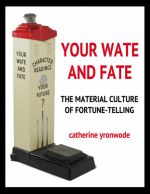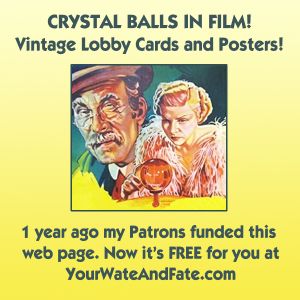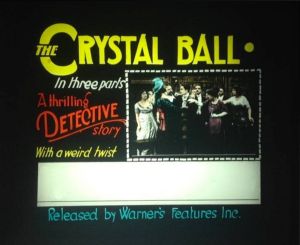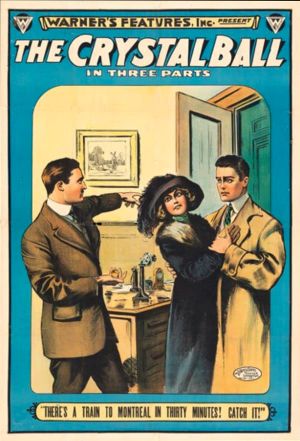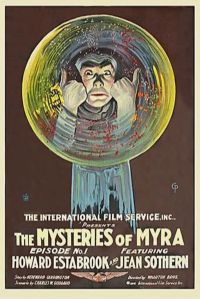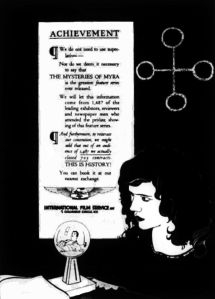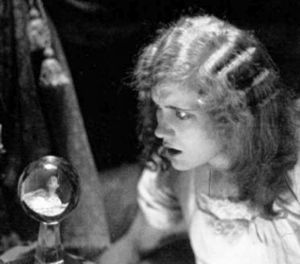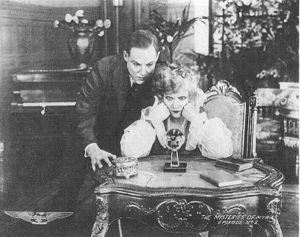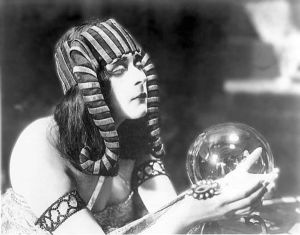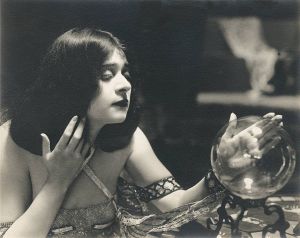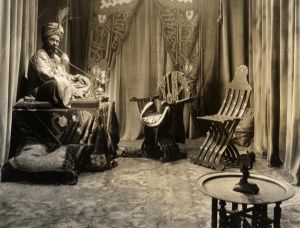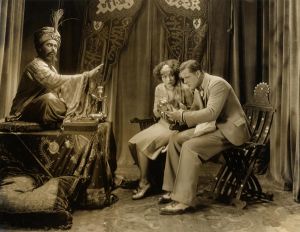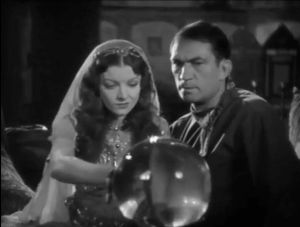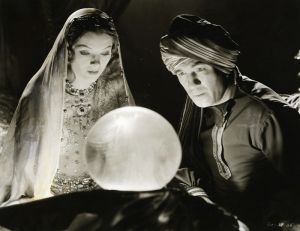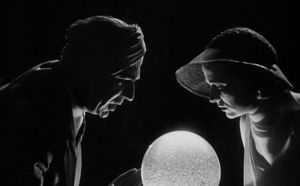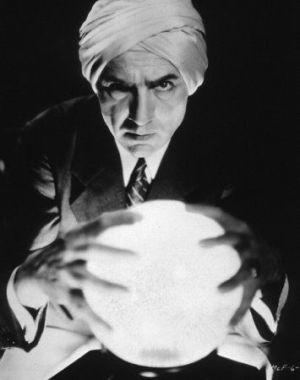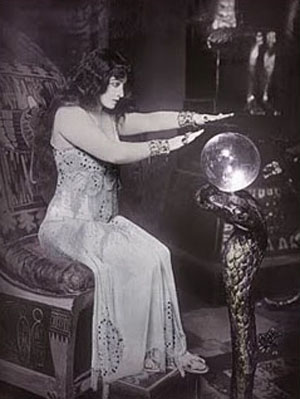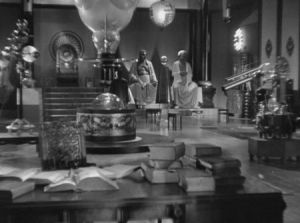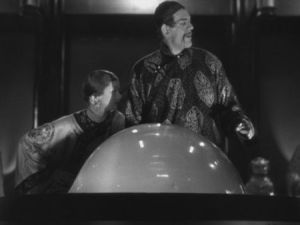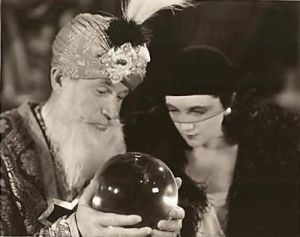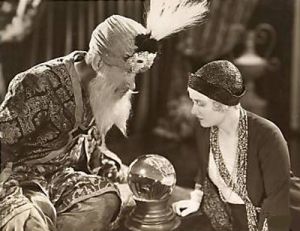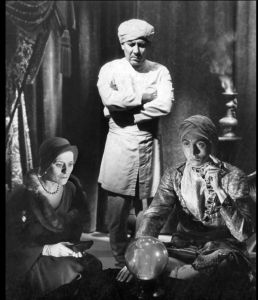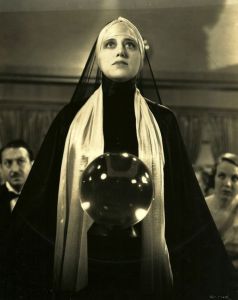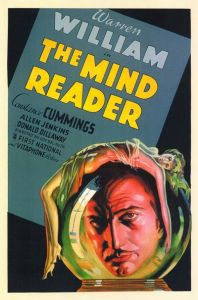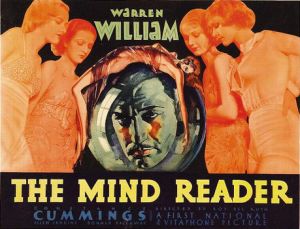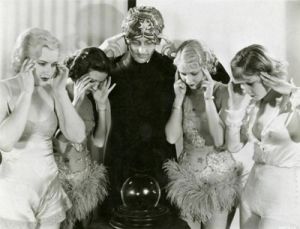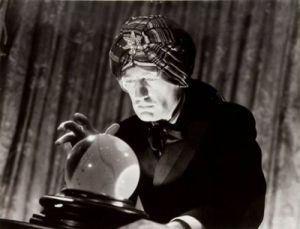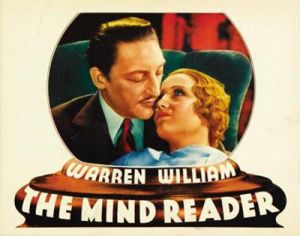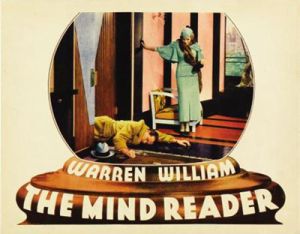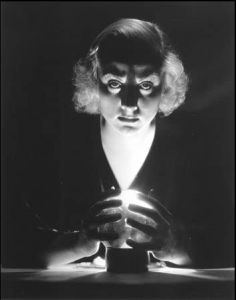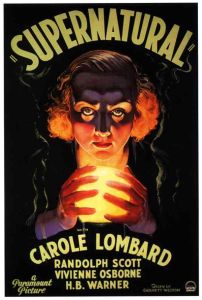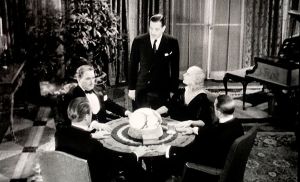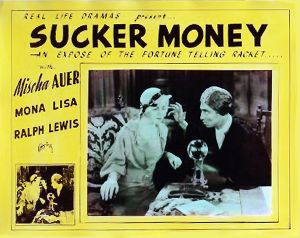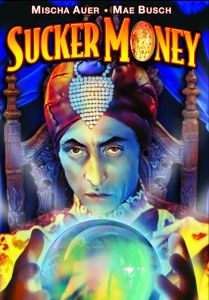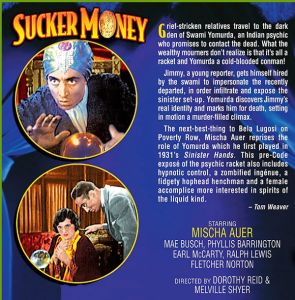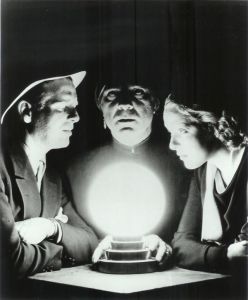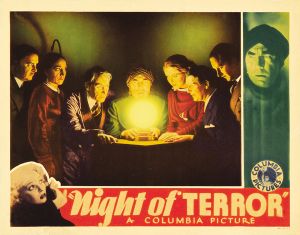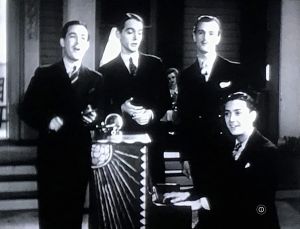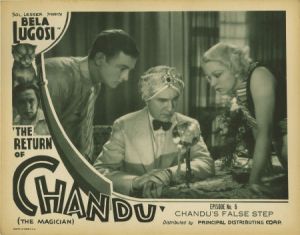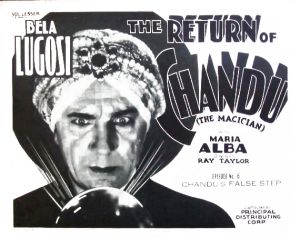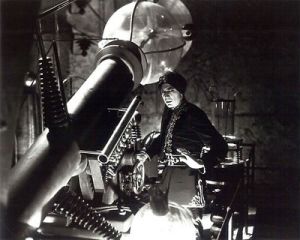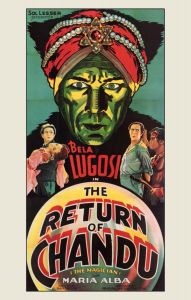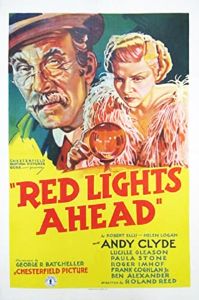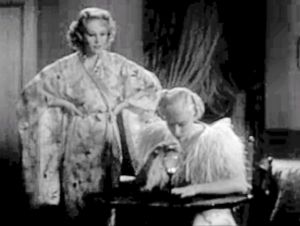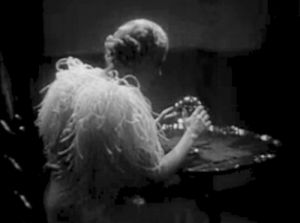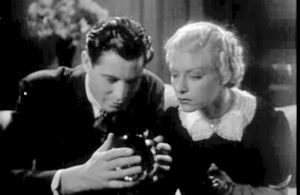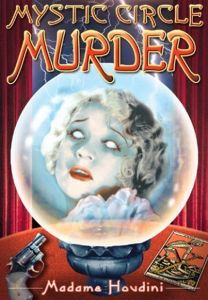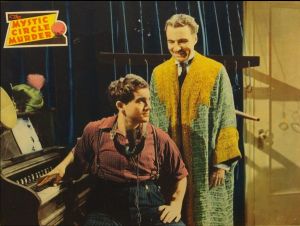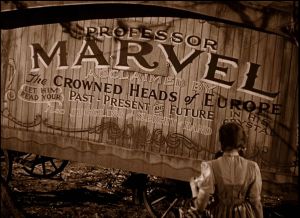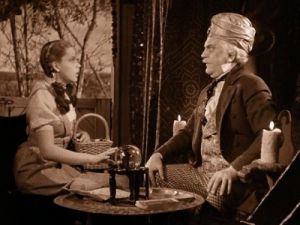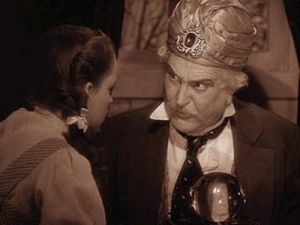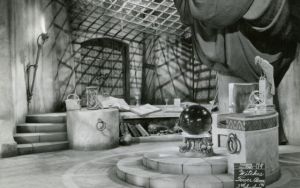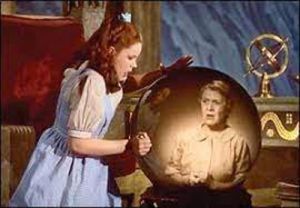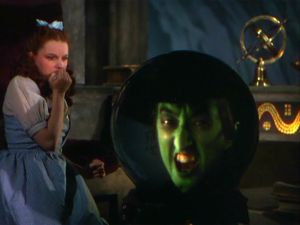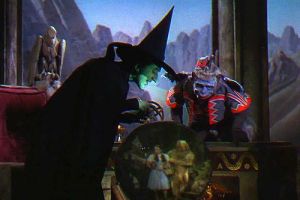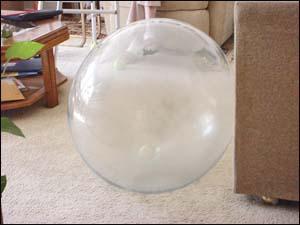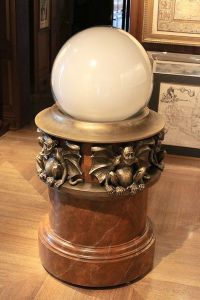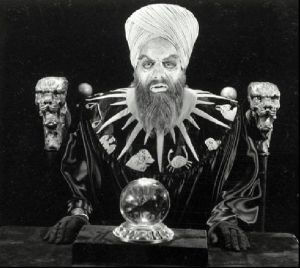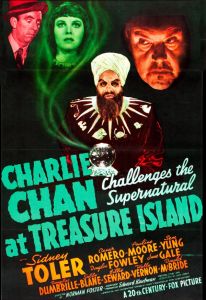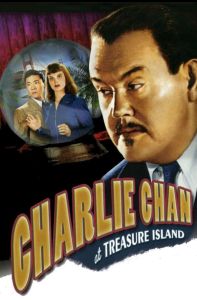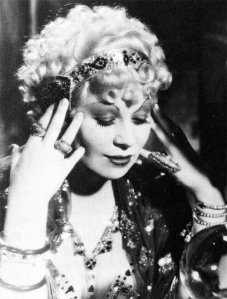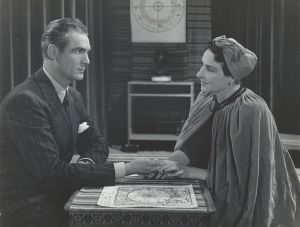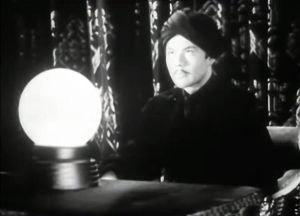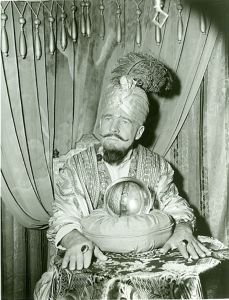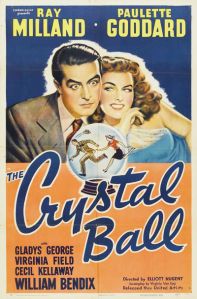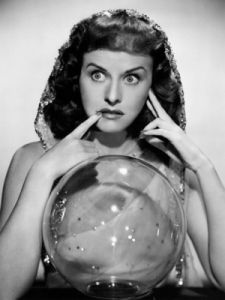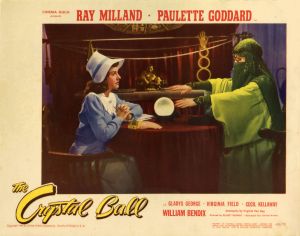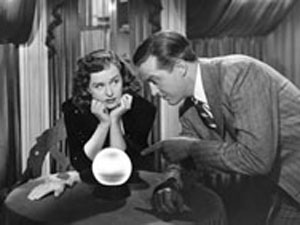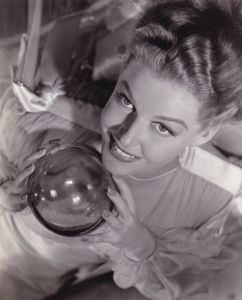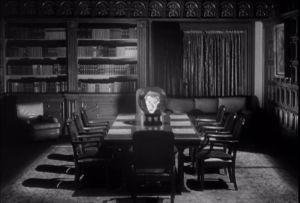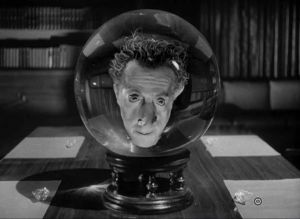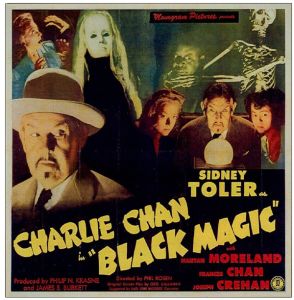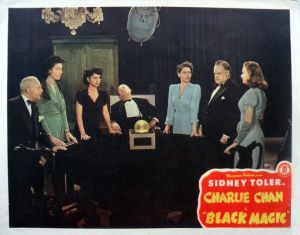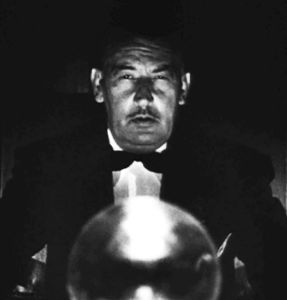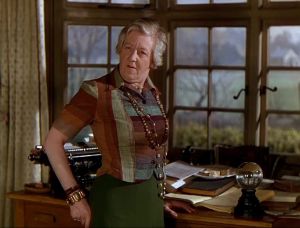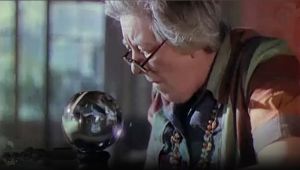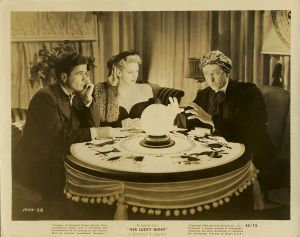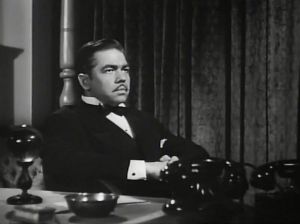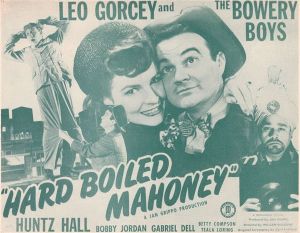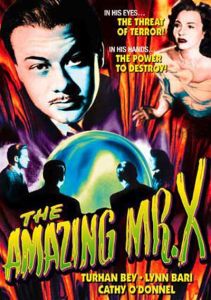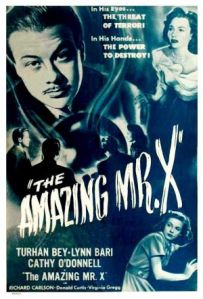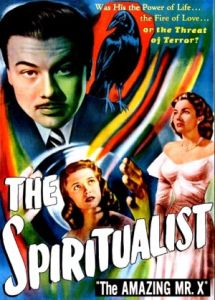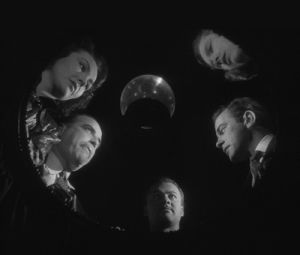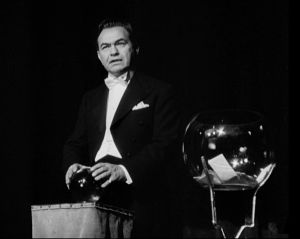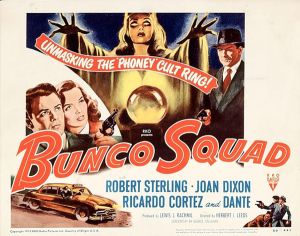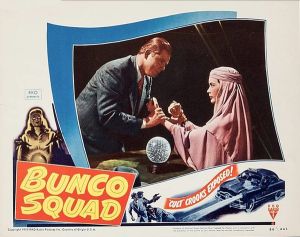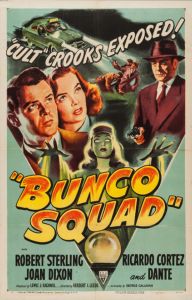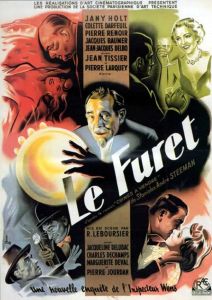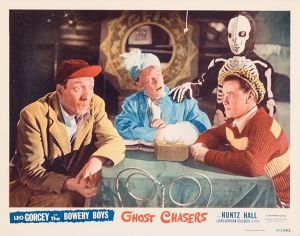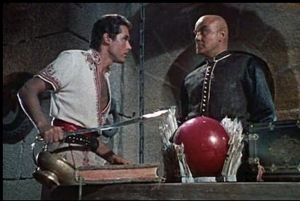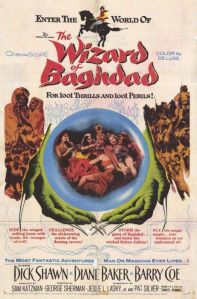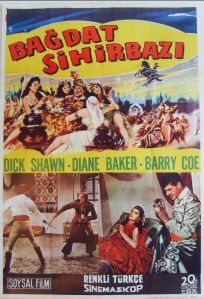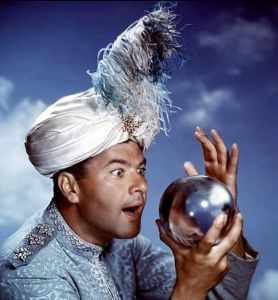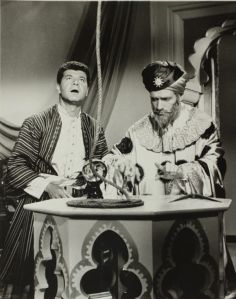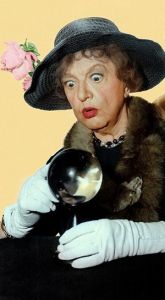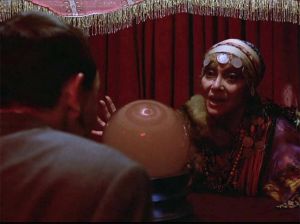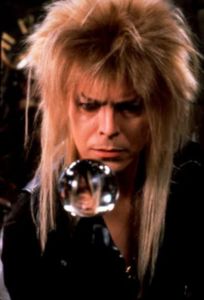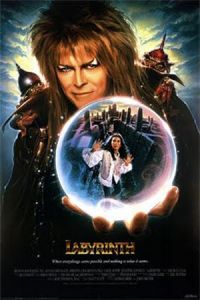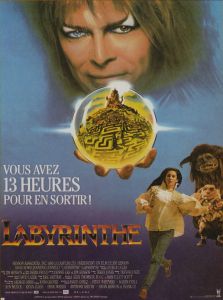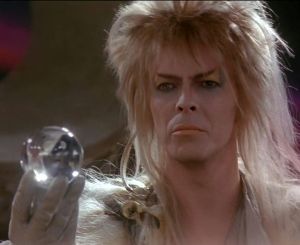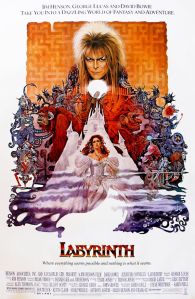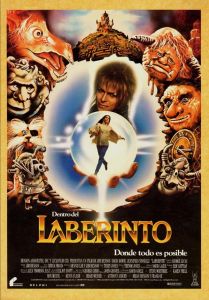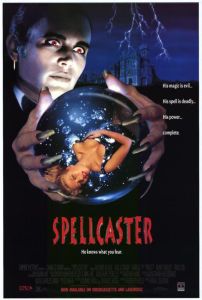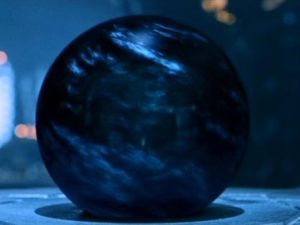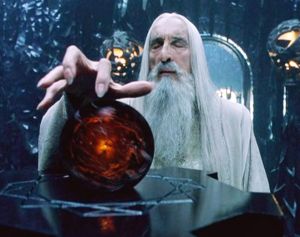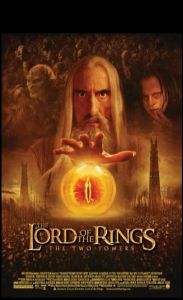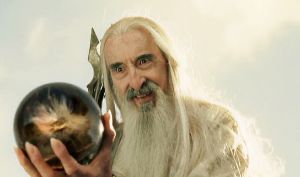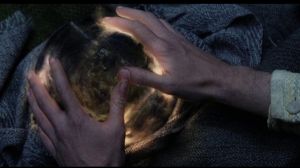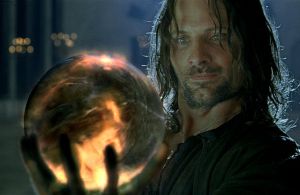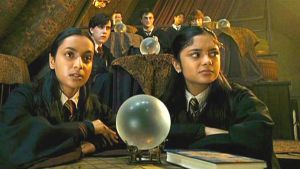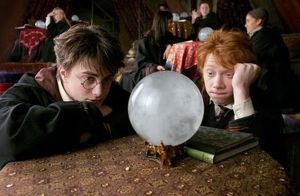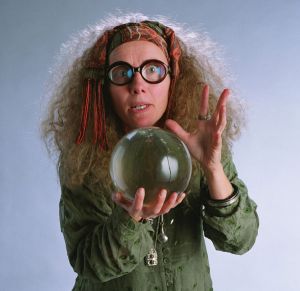Crystal Balls in Film: Difference between revisions
No edit summary |
(cleanup) |
||
| (2 intermediate revisions by the same user not shown) | |||
| Line 32: | Line 32: | ||
<hr> | <hr> | ||
<br> | <br> | ||
== Crystal Balls in Film == | == Crystal Balls in Film == | ||
| Line 51: | Line 50: | ||
</center> | </center> | ||
When considering how the subject of fortune telling is handled in cinema, one is immediately hit with the typical screenwriters' generally agnostic or atheistic attitude toward any form of spirituality or folk belief beyond extreme deference to Christianity (often in the form of Catholic devotionalism). Once the self-imposed set of film industry guidelines known as the Hays Code was instituted in 1934, not only was sexuality suppressed in cinema, but, with a few exceptions, actors from all ethnic minority cultures -- Jews, Blacks, Asians, Native Americans -- were mostly eliminated from leading roles and reduced to small comedy bits or set pieces as villains or victims. Fortune tellers underwent the same deprecation, and in very few post-Code films are the psychics truly psychic. | |||
| Line 61: | Line 60: | ||
File:The-Mysteries-of-Myra-Jean-Sothern-Variety-advertisement-1916.jpg|1916: "The Mysteries of Myra," starring Jean Sothern as Myra Maynard. The text of this ad reads: "ACHIEVEMENT - We do not need to use superlatives -- Nor do we deem it necessary to say that THE MYSTERIES OF MYRA is the greatest ''feature series'' ever released. We will let this information come from 1,487 of the leading exhibitors, reviewers and newspaper men who attended the private showing of this feature series. ''And furthermore, to reiterate our contention, we might add that out of an audience of 1,487 we actually closed 703 contracts.'' THIS IS HISTORY! You can book it at our nearest exchange. INTERNATIONAL FILM SERVICE INC., 1 COLUMBUS CIRCLE, N.Y." The "contracts" referred to in the text committed theater owners to show every chapter for one week, until the series was completed. This serialized movie was so popular that it was also issued in the form of a novelization in 1916. <br>Black and white advertisement in ''"Variety Magazine,"'' April 28, 1916; p. 29.<br>Genre: Occult, Horror. | File:The-Mysteries-of-Myra-Jean-Sothern-Variety-advertisement-1916.jpg|1916: "The Mysteries of Myra," starring Jean Sothern as Myra Maynard. The text of this ad reads: "ACHIEVEMENT - We do not need to use superlatives -- Nor do we deem it necessary to say that THE MYSTERIES OF MYRA is the greatest ''feature series'' ever released. We will let this information come from 1,487 of the leading exhibitors, reviewers and newspaper men who attended the private showing of this feature series. ''And furthermore, to reiterate our contention, we might add that out of an audience of 1,487 we actually closed 703 contracts.'' THIS IS HISTORY! You can book it at our nearest exchange. INTERNATIONAL FILM SERVICE INC., 1 COLUMBUS CIRCLE, N.Y." The "contracts" referred to in the text committed theater owners to show every chapter for one week, until the series was completed. This serialized movie was so popular that it was also issued in the form of a novelization in 1916. <br>Black and white advertisement in ''"Variety Magazine,"'' April 28, 1916; p. 29.<br>Genre: Occult, Horror. | ||
File:The-Mysteries-of-Myra-Jean-Sothern-movie-still-1916.jpg|1916: "The Mysteries of Myra," starring Jean Sothern as Myra Maynard. Myra flirts with the occult as the Black Order closes in on her, trying to force her to suicide through the exercise of mental concentration. This photo is the basis for the ''"Variety Magazine,"'' advertisement. "The Mysteries of Myra" is an important film because not only does it present the use of divination tools such as the crystal and automatic writing, it was the first movie to feature a sinister and secretive Satanic occult order, astral travel, evil Voodoo practitioners, hypnotic control by means of spinning mirrors, and a bizarre humanoid monster along the lines of Frankenstein.<br>Black and white movie still.<br>Genre: Occult, Horror. | |||
File:The-Mysteries-of-Myra-Jean-Sothern-Howard-Estabrook-movie-still-1916.jpg|1916: "The Mysteries of Myra," starring Jean Sothern as Myra Maynard and Howard Estabrook as Dr. Payson Alden. in Episode 2 "The Poisoned Flower," Sothern gives the double-thumbs-up sign that identifies members of The Black Order as she and Estabrook stare into the ominous orb. <br>Black and white still.<br>Genre: Horror. | |||
</gallery> | </gallery> | ||
</center> | </center> | ||
During the Hays Code era, from 1934 to 1968, fortune tellers were generally portrayed as comedic bumblers, scamming fraudsters, or wicked villains -- or a combination thereof. One favoured trope was the fraudulent fortune teller who is surprised when a prediction actually comes true. Another stereotype was the fraudulent fortune teller who reforms in order to find love, or dies in the attempt. A third styling featured the evil "exotic" fortune teller, often Romani or Asian, who manipulates clients for monetary gain. A fourth concept was the wise elder who dons a costume and poses as a fortune teller in order to convey information to younger people in order to improve their lives. | |||
<center> | <center> | ||
<gallery widths="300px" heights="300px" perrow="2" align="center; cellspacing=8px; cellpadding: 5px 5px 5px 5px;"> | <gallery widths="300px" heights="300px" perrow="2" align="center; cellspacing=8px; cellpadding: 5px 5px 5px 5px;"> | ||
File: | File:Cleopatra-Theda-Bara-1917.jpg|1917: "Cleopatra," starring Theda Bara in the title role, Fritz Leiber Sr. as Julius Caesar, and Thurston Hall as Mark Antony. Theda Bara caresses her crystal, which is pretty obviously a light-weight blown glass sphere and not a priceless earth-born gem. <br>Black and white still.<br>Genre: Drama. | ||
File: | File:Salome-Theda-Bara-1918.jpg|1918: "Salome", starring Theda Bara as Salome. This is a lost film from which many stills and a few film clips survive. Attempts at reconstructing it are ongoing. <br>Black and white publicity still.<br>Genre: Drama. | ||
</gallery> | </gallery> | ||
| Line 85: | Line 83: | ||
In addition to the cultural biases against fortune telling that permeated early to mid 20th century cinema, the portrayal of psychic readers faced another considerable barrier as a subject for film -- one that is a ludicrous byproduct of the filmic art itself: The tools of fortune telling are too small to film well! This sounds so silly, but think about it: [[:Category:Cartomancy|cartomancy]], [[:Category:Palmistry|palmistry]], [[:Category:Astrology|horoscopy]], [[:Category:Tasseomancy|tasseomancy]], [[:Category:Dice Reading|dice reading]], [[:Category:Domino Reading|domino reading]], and [[:Category:Crystal Gazing|crystal gazing]] are table-top activities, and their tools generally fill a space from two inches square, for a small crystal ball, to the size of a sheet of letter or legal paper, for a horoscope. | |||
=TWENTIES= | =TWENTIES= | ||
| Line 101: | Line 97: | ||
</gallery> | </gallery> | ||
</center> | </center> | ||
What this means in terms of cinematic staging is that a wide view of a room will not disclose the presence of these divination tools, and only in a close-up will the audience perceive them. But even then, how will uninformed viewers interpret the images? Will a tarot card of the Page of Pentacles be meaningful? How about the lines on the palm of an actor's hand (and what if the actor's palm lines do not correspond to the nature of the character he is playing)? Can the roll of three dice, even in close-up, be emotionally significant to a film-goer who knows nothing about [:Category:Dice Reading|dice-reading]]? The answer is "No." Of all the popular methods of divining, only [:Category:Astrology|astrology]] looks good when blown up to the size of a wall chart, even though a horoscope is little more than window-dressing to anyone but an [:Category:Astrology|astrologer]]. As for crystal balls -- they are simply too small, too reflective, and too clear to make an impact. | |||
<center> | <center> | ||
| Line 111: | Line 111: | ||
</gallery> | </gallery> | ||
</center> | </center> | ||
These problems were solved in various ways for various forms of fortune telling in cinema -- but for crystal balls, one solution was obvious: BIGGER BALLS. | |||
=THIRTIES= | =THIRTIES= | ||
| Line 125: | Line 129: | ||
</gallery> | </gallery> | ||
</center> | </center> | ||
In an earlier episode on Crystal Balls in Art, which i titled [[Lovely Ladies and Their Little Balls]], i presented gallery and commercial art that featured women holding small crystal spheres, ranging in size from 2" finger balls to 3" palm balls. Although small balls sometimes appear in film, they are more likely to be placed on a stalk-like stand than to be held in the hand. Far more common in cinema, however, are 4" and 5" table balls, placed in carved wooden stands. | |||
<center> | <center> | ||
| Line 136: | Line 144: | ||
</center> | </center> | ||
But, as the Nobel-Prize-winning ethologist Nikolaas Tinbergen demonstrated, we are all influenced why what T. N. C. Vidya calls "the curious phenomenon of exaggerated responses to supernormal stimuli in animals." Briefly put, in the mid-20th century, Tinbergen discovered a previously unexamined feature common to virtually all animal species, namely,the preference for "supernormal stimuli," that is, objects that are larger, more vividly coloured, more highly flavoured, or more strongly scented than the natural counterparts with which the animals have had a millennias-old co-evolutionary relationship. In birds, such as the Oystercatchers and Herring Gulls that Tinbergen studied, this preference led to the females abandoning their own fertilized eggs in favour of larger artificial eggs with distinct speckling. After abandoning their own smaller and drabber eggs, they would attempt to sit upon artificial eggs so large they could not brood them, wasting an entire nesting season trying to hatch the supernormal eggs, resulting in no babies at all. It is this same preference for the supernormal that leads humans to prefer highly seasoned and super-sized fast food, and to prefer plastic-surgery-enhanced porn models to natural mates. | |||
<center> | <center> | ||
<gallery widths="300px" heights="300px" perrow="2" align="center; cellspacing=8px; cellpadding: 5px 5px 5px 5px;"> | <gallery widths="300px" heights="300px" perrow="2" align="center; cellspacing=8px; cellpadding: 5px 5px 5px 5px;"> | ||
| Line 145: | Line 157: | ||
</gallery> | </gallery> | ||
</center> | </center> | ||
Returning to crystal balls: Hollywood, the ever-ready provider of tall men, big-busted women, and extra-large cartons of popcorn, could not resist super-sizing the crystal balls in the movies. 5" optical glass balls were used for table-top scenes featuring an intimate couple or a reader-client pairing, but more highly favoured were hollow glass spheres filled with swirling smoke. The smoke mechanism was placed under the table upon which the faux crystal ball rested on a circular wooden base, and a light bulb shone from below to highlight the smoke trails and cast eerie up-lighting on the fortune teller. | |||
| Line 156: | Line 171: | ||
</gallery> | </gallery> | ||
</center> | </center> | ||
But of course, like Tinbergen's Oystercatchers and Herring Gulls, there was always a larger crystal ball to be had -- and by 1932's "The Mask of Fu Manchu," starring Boris Karloff, the supersized hollow sphere made its debut. 1934 brought us "The Return of Chandu," starring Bela Lugosi, and a series of balls ever larger, until one of them becomes part of a complex machine that dwarfs its creator. | |||
<center> | <center> | ||
| Line 186: | Line 205: | ||
</gallery> | </gallery> | ||
</center> | </center> | ||
The apotheosis of the ginormous crystal ball came in 1939, with "The Wizard of Oz," starring Judy Garland as Dorothy Gale and Frank Morgan in the title role as both Professor Marvel and the Wizard. Beginning his journey in Kansas, the Professor has a very nice table-top crystal, but once the Land of Oz is entered, the crystal becomes a smoke--filled light-source, and is then put to double use as the Wicked Witch of the West, played by Margaret Hamilton, uses it to spy on Dorothy, while Dorothy uses it to cast a nostalgic glance at her Aunt Em, played by Clara Blandick. Remarkably, this prop, long thought lost, was found in a Hollywood junkyard and is now a treasured relic reminding us of the days when crystal balls were almost as large as the hot air balloon that The Wizard uses to return to Kansas, where he resumes his workaday life as Professor Marvel, who will "Read Your Past - Present and Future in His Crystal." | |||
<center> | <center> | ||
| Line 204: | Line 227: | ||
</gallery> | </gallery> | ||
</center> | </center> | ||
Why would anyone spend 20 years collecting digital images of crystal balls in film, anyway? | |||
<center> | <center> | ||
| Line 222: | Line 249: | ||
</gallery> | </gallery> | ||
</center> | </center> | ||
Good question, but as you can see, this has been one of my eccentric passions for quite a while. Here we are, at Part 3, and the images have not all been uploaded yet -- and as much as i hate to admit it, there are probably dozens of movies featuring crystal gazers that have eluded my knowledge. | |||
<center> | <center> | ||
| Line 232: | Line 263: | ||
</gallery> | </gallery> | ||
</center> | </center> | ||
One reason i know that there are more films about crystallomancy out there for me to find is that i have a couple dozen still photos of movie stars posing with crystal balls -- but i cannot link them to a film. Perhaps they were just publicity shots, but the costuming is such that i think there must be a film behind each one, somewhere. | |||
<center> | <center> | ||
| Line 240: | Line 275: | ||
</gallery> | </gallery> | ||
</center> | </center> | ||
And that's where you can help! If we've missed one of your favourites, or made a mistake along the way, drop us a line at the Lucky Mojo Forum (no email or social media messages, please) and let us know about it. | |||
<center> | <center> | ||
| Line 260: | Line 299: | ||
</gallery> | </gallery> | ||
</center> | </center> | ||
This showcase list of crystallomantic films is chronological, as were previous gallery collections. Once every photo is cleaned and uploaded, the entire pile will be compiled, and one year after that, it will open to the public. In the meantime, you can say that you saw them here first. | |||
<center> | <center> | ||
| Line 274: | Line 317: | ||
</gallery> | </gallery> | ||
</center> | </center> | ||
Having talked about Hollywood's preference for glowing, smoke-filled balls, or balls so large that they can serve as small television units, it's time to address the issue of Hollywood's preferred styles of crystal gazer. These types have changed over the years, but not as much as one might think. | |||
<center> | <center> | ||
| Line 284: | Line 331: | ||
</gallery> | </gallery> | ||
</center> | </center> | ||
'''The Man in the Turban:''' This cinematic stereotype is based almost entirely of the dramatic and very influential stage presentations of Claude Alexander Conlin. As Alexander, the Man Who Knows, he and his troupe of dancing girls (one of whom was his wife) and stage hands (one of whom was his poster artist) travelled from theater to theater by rail, towing an entire box car filled with their elaborate stage props, posters, costumes, and booklets to sell at the back of the room. Alexander wore a turban as part of his act, and dressed in amazing finery imported from India and designed to lend him an air of mystery. If you are unfamiliar with him, look no farther than the book "Secrets of the Crystal Silence League," which contains not only the text of two of his instructional booklets from 1919 and 1923, but is also filled with art used to promote him, and those who assiduously, even slavishly, copied both his stage act and his sartorial style. Actors who donned the turban include Warren William, Will Rogers, Henry Kolker, and Frank Morgan. | |||
<center> | <center> | ||
| Line 329: | Line 379: | ||
File:wizard-of-oz-wicked-witch-crystal-ball-Cornell-University.jpg|1939: "The Wizard of Oz," starring Judy Garland, Frank Morgan, Billie Burke, Margaret Hamilton, and a cast of thousands. Once recovered from the discard pile in the prop house maintained by its creator, Kenneth Strickfaden, the Wicked Witch's iconic 25-inch orb was outfitted with an elaborate stand that replicated the lost original, and a new working projector was installed inside it in 2018. <br>Genre: Fantasy. | File:wizard-of-oz-wicked-witch-crystal-ball-Cornell-University.jpg|1939: "The Wizard of Oz," starring Judy Garland, Frank Morgan, Billie Burke, Margaret Hamilton, and a cast of thousands. Once recovered from the discard pile in the prop house maintained by its creator, Kenneth Strickfaden, the Wicked Witch's iconic 25-inch orb was outfitted with an elaborate stand that replicated the lost original, and a new working projector was installed inside it in 2018. <br>Genre: Fantasy. | ||
</gallery> | </gallery> | ||
</center> | </center> | ||
'''The Man in the Black Suit:''' The suave male crystal gazer who does not wear a turban is best exemplified by Turhan Bey and Alan Dinehart. This character too draws his formal style from that of a stage magician, but his look is more akin to a prestidigitator than a swami. | |||
<center> | <center> | ||
<gallery widths="300px" heights="300px" perrow="2" align="center; cellspacing=8px; cellpadding: 5px 5px 5px 5px;"> | <gallery widths="300px" heights="300px" perrow="2" align="center; cellspacing=8px; cellpadding: 5px 5px 5px 5px;"> | ||
File:Charlie-Chan-at-Treasure-Island-Dr-Zodiac-Gerald-Mohr-1939.jpg|1939: "Charlie Chan at Treasure Island," starring Sidney Toler, Cesar Romero, and Victor Sen Yung, and featuring Gerald Mohr as Dr. Zodiac in a wild costume with a yoke that depicts all of the Sun Signs. Charlie's investigation of a phony psychic during the 1939 World Exposition on San Francisco's Treasure Island leads him to expose a suicide as murder. <br>Black and white publicity still.<br>Genre: Mystery. | |||
File:Charlie-Chan-at-Treasure-Island-Sidney-Toler-Cesar-Romero-movie-poster-01-1939.jpg|1939: "Charlie Chan at Treasure Island," starring Sidney Toler and Cesar Romero, and featuring Gerald Mohr as the sinister Dr. Zodiac. <br>Colour movie poster.<br>Genre: Mystery. | File:Charlie-Chan-at-Treasure-Island-Sidney-Toler-Cesar-Romero-movie-poster-01-1939.jpg|1939: "Charlie Chan at Treasure Island," starring Sidney Toler and Cesar Romero, and featuring Gerald Mohr as the sinister Dr. Zodiac. <br>Colour movie poster.<br>Genre: Mystery. | ||
| Line 345: | Line 399: | ||
</center> | </center> | ||
'''The Exotic Spooky Woman:''' These women are dressed in expensive finery, their bosoms are well endowed, their hair is coifed, and very often they are surrounded by stunning Arabic brassware and yards of Chinese draperies. Pauline Frederick and Theda Bara exemplify this type to a "T." | |||
| Line 357: | Line 413: | ||
=FORTIES= | =FORTIES= | ||
'''The Mesmerized Woman:''' Women who stare into crystal balls until their minds become unhinged are an interesting lot. They may start out not believing in the supernatural, but the lure of the crystal is hypnotic and they end up glazed-over, drugged, or just plain weird as they stare into its depths. Jean Sothern, Ann Doran, and Carol Lombard should get Oscars for portraying this type, with Clara Bow a runner-up and Judy Garland given an honourable mention. | |||
<center> | <center> | ||
| Line 375: | Line 435: | ||
</gallery> | </gallery> | ||
</center> | </center> | ||
'''The Ditzy Crystal Dame:''' The middle-aged comedic character actress whose crystal ball never seems to tell the truth, and who is completely flustered if it does, is a special sort of Hollywood type. Marion Lorne, Emma Thomson and Erica Yohn are stand-outs in this genre. | |||
<center> | <center> | ||
| Line 389: | Line 453: | ||
</gallery> | </gallery> | ||
</center> | </center> | ||
'''The Fake Crystal Gazer:''' The carnival cheat and the private reading swindler provide the moral basis for Hollywood's notorious anti-occult stance. Some, like Warren William and Frank Morgan, also wear the turban, some, like Turhan Bey and Alan Dinehart, are suave and classy in contemporary street clothes. A bit more unusual is the nice-girl-roped-into-carny-life, portrayed by Paulette Goddard. | |||
<center> | <center> | ||
<gallery widths="300px" heights="300px" perrow="2" align="center; cellspacing=8px; cellpadding: 5px 5px 5px 5px;"> | <gallery widths="300px" heights="300px" perrow="2" align="center; cellspacing=8px; cellpadding: 5px 5px 5px 5px;"> | ||
File:Ann-Sheridan-with-Crystal-Ball-black-and-white-still.jpg|1940s: Ann Sheridan holding a crystal ball. Here is one of our mystery photos. Is this just a cute publicity photo or does it relate to a film in which the actress-singer Ann Sheridan actually appeared? <br>Black and white publicity still. | File:Ann-Sheridan-with-Crystal-Ball-black-and-white-still.jpg|1940s: Ann Sheridan holding a crystal ball. Here is one of our mystery photos. Is this just a cute publicity photo or does it relate to a film in which the actress-singer Ann Sheridan actually appeared? <br>Black and white publicity still. | ||
| Line 398: | Line 464: | ||
</gallery> | </gallery> | ||
</center> | </center> | ||
'''The Witch:''' Witches who read crystal balls are featured in fantasy settings. Marion Lorne is both a witch and a ditzy dame, and Emma Thompson is a half-blood witch, but when it comes to pure, unadulterated wicked witchcraft, Margaret Hamilton reigns supreme. | |||
<center> | <center> | ||
| Line 413: | Line 483: | ||
File:Black-Magic-Sidney-Toler-as-Charlie-Chan-colour-movie-poster-1944.jpg|1944: "Black Magic," starring Sydney Toler as the Chinese-American detective Charlie Chan and Mantan Moreland as Birmingham Brown. Charlie searches for a murderer amidst numerous ghosts conjured up by a strange variety of spiritualists and occultists.<br>Colour movie poster.<br>Genre: Mystery. | File:Black-Magic-Sidney-Toler-as-Charlie-Chan-colour-movie-poster-1944.jpg|1944: "Black Magic," starring Sydney Toler as the Chinese-American detective Charlie Chan and Mantan Moreland as Birmingham Brown. Charlie searches for a murderer amidst numerous ghosts conjured up by a strange variety of spiritualists and occultists.<br>Colour movie poster.<br>Genre: Mystery. | ||
File:Black-Magic-lobby-card-1944.jpg|1944: "Black Magic," starring Sidney Toler as the Honolulu police detective Charlie Chan, Frances Chan as Frances Chan, Dick Gordon as William Bonner, Geraldine Wall as Harriet Green, Frank Jaquet as Paul Hamlin, Mantan Moreland as Birmingham Brown, and Claudia Dell as Vera Starkey. Toler was the second European-American actor to play the Chinese-American Charlie Chan on screen, and he starred in 22 Charlie Chan movies made between 1938 and 1946.<br>Colour lobby card.<br>Genre: Mystery. | |||
File:Black-Magic-Dick-Gordon-as-William-Bonner-1944.jpg|1944: "Black Magic," starring Sydney Toler as Charlie Chan, Mantan Moreland as Birmingham Brown, Joseph Crehan as Sgt. Matthews, Jacqueline deWit as Justine Bonner, and featuring Dick Gordon as William Bonner, with his sinister crystal ball.<br>Black and white still.<br>Genre: Mystery. | File:Black-Magic-Dick-Gordon-as-William-Bonner-1944.jpg|1944: "Black Magic," starring Sydney Toler as Charlie Chan, Mantan Moreland as Birmingham Brown, Joseph Crehan as Sgt. Matthews, Jacqueline deWit as Justine Bonner, and featuring Dick Gordon as William Bonner, with his sinister crystal ball.<br>Black and white still.<br>Genre: Mystery. | ||
| Line 418: | Line 490: | ||
</gallery> | </gallery> | ||
</center> | </center> | ||
'''The Wizard:''' Another character from fantasy films is the wizard with a crystal. Rarely a helper, he usually is a supernormal villain. Christopher Lee, Boris Karloff, and David Bowie are examples of this type. | |||
<center> | <center> | ||
<gallery widths="300px" heights="300px" perrow="2" align="center; cellspacing=8px; cellpadding: 5px 5px 5px 5px;"> | <gallery widths="300px" heights="300px" perrow="2" align="center; cellspacing=8px; cellpadding: 5px 5px 5px 5px;"> | ||
| Line 427: | Line 504: | ||
</gallery> | </gallery> | ||
</center> | </center> | ||
One of the best parts of collecting images of crystal balls in cinema is the prospect of locating the film and watching it. Whether sincere, hokey, spooky, or corny, every one of these movies tells us something about how crystal gazing was seen by the screen writers and directors of the past 125 years, and also how the prop masters and actors dealt with the crystal sphere as an artifact. | |||
<center> | <center> | ||
<gallery widths="300px" heights="300px" perrow="2" align="center; cellspacing=8px; cellpadding: 5px 5px 5px 5px;"> | <gallery widths="300px" heights="300px" perrow="2" align="center; cellspacing=8px; cellpadding: 5px 5px 5px 5px;"> | ||
File:Her-Lucky-Night-1945-Noah-Beery-Jr-Martha-O-Driscoll.jpg|1945" "Her Lucky Night," starring the Andrews Sisters, Martha O'Driscoll, and Noah Beery, Jr. Here Martha O'Driscoll gets her fortune told by a crystal gazer. <br> Black and white lobby card. <br> Genre: Comedy, Music, Musical. | File:Her-Lucky-Night-1945-Noah-Beery-Jr-Martha-O-Driscoll.jpg|1945" "Her Lucky Night," starring the Andrews Sisters, Martha O'Driscoll, and Noah Beery, Jr. Here Martha O'Driscoll gets her fortune told by a crystal gazer. <br> Black and white lobby card. <br> Genre: Comedy, Music, Musical. | ||
| Line 436: | Line 516: | ||
</gallery> | </gallery> | ||
</center> | </center> | ||
We can learn about how fortune telling, prophesy, divination, and the occult have been perceived over the years when we see the role played by the crystal gazer in a fictional story. And because crystals are so flashy, they serve as stand-ins for all means of fortune telling. Prop and character are always linked: There are movies in which we can see horoscopes and astrologers, hands and palm readers, cards and cartomancers, and just flat out clairvoyant seers — but when the sets are dressed, many of those readers end up with a crystal ball somewhere in range of the camera's eye. They are simply too attractive to leave out of the picture. | |||
| Line 447: | Line 530: | ||
</gallery> | </gallery> | ||
</center> | </center> | ||
On the other hand, one of the most frustrating parts of collecting images of crystal balls in cinema is the issue of "lost films." It is shocking how many movies, both silent and sound, simply do not exist anymore. For some of these, we have a few publicity stills, newspaper advertisements, and lobby cards, but for others all that may remain are the notices in theatrical news magazines announcing the commencement or the wrap of shooting, or a review in some hick paper in Indiana that praised the show to the skies, thus adding to our frustration because we will never be able to see it. | |||
<center> | <center> | ||
<gallery widths="300px" heights="300px" perrow="2" align="center; cellspacing=8px; cellpadding: 5px 5px 5px 5px;"> | <gallery widths="300px" heights="300px" perrow="2" align="center; cellspacing=8px; cellpadding: 5px 5px 5px 5px;"> | ||
File:The-Amazing-Mr.-X-The-Spiritualist-1948-1-Turhan-Bey-Lynn-Bari-crystal-ball-colour-poster.jpg|1948: "The Amazing Mr. X," also released as "The Spiritualist," starring Turhan Bey as the lead character, with Lynn Bari and Cathy O'Donnell. <br> Colour poster. <br> Genre: Thriller. | File:The-Amazing-Mr.-X-The-Spiritualist-1948-1-Turhan-Bey-Lynn-Bari-crystal-ball-colour-poster.jpg|1948: "The Amazing Mr. X," also released as "The Spiritualist," starring Turhan Bey as the lead character, with Lynn Bari and Cathy O'Donnell. <br> Colour poster. <br> Genre: Thriller. | ||
| Line 462: | Line 548: | ||
</gallery> | </gallery> | ||
</center> | </center> | ||
Among the most frustrating of these lost films is "The Crystal Ball" of 1914. All that remains is a poster (with a crystal ball), a lantern slide advertisement (of a Hindu swami with a crystal ball), and a plot synopsis from "Moving Picture World" — yet this is the very first movie ever to feature a crystal ball. Also elusive -- although portions of it, and a complete novelization, remain -- is "The Mysteries of Myra," written by the enormously influential paranormal researcher and occult author Hereward Carrington, and featuring no less a personage than the occultist Aleister Crowley (at least according to some researchers). A dedicated group of film historians known as the Serial Squadron has restored and compiled the three episodes that remain, and, working from the contemporary novelization and script, have assembled publicity stills in their proper order to fill in as many blanks as possible -- but we will never see this movie the way it was shown in theaters when it was a weekly chapter-play that thrilled the nation. | |||
<center> | <center> | ||
| Line 471: | Line 561: | ||
</center> | </center> | ||
=FIFTIES= | |||
Another area of frustration involves my collection of publicity stills featuring actors and actresses (mostly actresses, if the truth be told) holding or gazing into crystal balls -- with no indication as to the date the photo was made or the name of the film — if there was one — to which it can be attached. Sometimes a search through the performer's filmography pays off and the image can be tagged to the right film. But quite a few remain loose and undated. | |||
<center> | <center> | ||
| Line 487: | Line 580: | ||
</gallery> | </gallery> | ||
</center> | </center> | ||
Then there's the problem that arises when we have seen a film once or even several times, or have read its synopsis, and we know for sure that there is a crystal ball scene in it, but no matter where we search, we cannot find a poster, publicity still, or lobby card of the scene in which the crystal ball appears. | |||
<center> | <center> | ||
| Line 499: | Line 596: | ||
=SIXTIES= | =SIXTIES= | ||
This is especially galling when we use the IMDb database to search for films with the keywords "crystal ball," and neither IMDb's image cache, nor a wider search engine exploration produces a single image, and we do not have the film in our own rather extensive collection. (Okay, frankly, we have thousands of films on DVD; but we are cheap and won't pay more than ten bucks each for them!) | |||
| Line 507: | Line 607: | ||
File:The-Wizard-of-Baghdad-2-1960.jpg|1960: "The Wizard of Baghdad," starring Dick Shawn as Genii Ali Mahmud. I have no idea what country this poster came from or what language it is in, but i am guessing it is Turkish. In any case, the movie seems to have gotten around.<br>Colour movie poster.<br>Genre: Comedy. | File:The-Wizard-of-Baghdad-2-1960.jpg|1960: "The Wizard of Baghdad," starring Dick Shawn as Genii Ali Mahmud. I have no idea what country this poster came from or what language it is in, but i am guessing it is Turkish. In any case, the movie seems to have gotten around.<br>Colour movie poster.<br>Genre: Comedy. | ||
File:The-Wizard-of-Baghdad-Dick-Shawn-1960.jpg|1961: "The Wizard of Baghdad" starring Dick Shawn as Genii Ali Mahmud, who has been turned into a mortal after his many failures and is sent to Baghdad, where he is given one last chance to prove himself worthy by helping a prince and princess fulfill a prophecy. Kind of like if Clarence the Angel Second Class from "It's a Wonderful Life" was a Djinn.<br>Colour publicity still. <br>Genre: Comedy. | File:The-Wizard-of-Baghdad-Dick-Shawn-1960.jpg|1961: "The Wizard of Baghdad" starring Dick Shawn as Genii Ali Mahmud, who has been turned into a mortal after his many failures and is sent to Baghdad, where he is given one last chance to prove himself worthy by helping a prince and princess fulfill a prophecy. Kind of like if Clarence the Angel Second Class from "It's a Wonderful Life" was a Djinn.<br>Colour publicity still. <br>Genre: Comedy. | ||
| Line 520: | Line 614: | ||
</gallery> | </gallery> | ||
</center> | </center> | ||
Sometimes we can rent or purchase a purported crystal ball film and make a screen-grab of the crystal ball scene — if the quality of the print is clear. Other times we know the film is not lost, but we cannot locate a copy anywhere. Or, sad to say, we lacked the time to make the screen grab this year, and are putting it off until ... whenever. | |||
<center> | <center> | ||
| Line 532: | Line 630: | ||
=EIGHTIES= | =EIGHTIES= | ||
With all of that in mind, we have arrived at a plan to make this collection bigger, better, and more eccentric than ever: crowd-sourcing. What follows is a list of films that have crystal balls in them, according to the IMDb keyword database, which is itself crowd-sourced, and thus prone to error. | |||
<center> | <center> | ||
| Line 540: | Line 641: | ||
</gallery> | </gallery> | ||
</center> | </center> | ||
Still, despite the possibility of crowd-sourcing errors, these are films we have not seen yet — and they are the films from which we want crystal ball screen grabs. If, during a search at IMDb or elsewhere online we have found a publicity still, poster, or lobby card of a man in a turban, we presume that he is a "Swami" or crystal gazer character in the film, and we offer both the character name and the actor's name. | |||
<center> | <center> | ||
| Line 547: | Line 652: | ||
File:Labyrinth-1986-David-Bowie-Poster-1.jpg|1986: "Labyrinth," starring David Bowie and Jennifer Connelly.<br>Colour movie poster.<br>Genre: Fantasy. | File:Labyrinth-1986-David-Bowie-Poster-1.jpg|1986: "Labyrinth," starring David Bowie and Jennifer Connelly.<br>Colour movie poster.<br>Genre: Fantasy. | ||
File:Labyrinth-1986-David-Bowie-Poster-4.jpg||1986: "Labyrinth," starring David Bowie as Jareth, the Goblin King, and Jennifer Connelly as Sarah.<br>Colour publicity still.<br>Genre: Fantasy. | File:Labyrinth-1986-David-Bowie-Poster-4.jpg||1986: "Labyrinth," starring David Bowie as Jareth, the Goblin King, and Jennifer Connelly as Sarah.<br>Colour publicity still.<br>Genre: Fantasy. | ||
File:Labyrinth-1986-David-Bowie-Looking-Into-Crystal-Ball-2.jpg|1986: "Labyrinth," starring David Bowie and Jennifer Connelly. Bowie, as Jareth, the Goblin King, forces Sarah to rescue her infant half-brother from a large maze. <br>Colour movie poster.<br>Genre: Fantasy. | File:Labyrinth-1986-David-Bowie-Looking-Into-Crystal-Ball-2.jpg|1986: "Labyrinth," starring David Bowie and Jennifer Connelly. Bowie, as Jareth, the Goblin King, forces Sarah to rescue her infant half-brother from a large maze. <br>Colour movie poster.<br>Genre: Fantasy. | ||
File:Labyrinth-1986-David-Bowie-Poster-2.jpg|1986: "Labyrinth," starring David Bowie and Jennifer Connelly.<br>Colour movie poster.<br>Genre: Fantasy. | File:Labyrinth-1986-David-Bowie-Poster-2.jpg|1986: "Labyrinth," starring David Bowie and Jennifer Connelly.<br>Colour movie poster.<br>Genre: Fantasy. | ||
| Line 571: | Line 664: | ||
</center> | </center> | ||
=NINETIES= | |||
Can you help by supplying a screen shot of a crystal ball scene in any of these movies? | |||
* 1918: "Betta, the Gipsy" | |||
** In Wales, a gypsy queen changes her sister's dead baby for one by the same father. The child grows up to marry her daughter. | |||
** Director: Charles Raymond | Stars: Marga Rubia Levy, Malvina Longfellow, George Foley, Edward Combermere | |||
<center> | <center> | ||
| Line 584: | Line 682: | ||
=OUGHTS= | =OUGHTS= | ||
* 1922: "Haxan," a.k.a. "Witchcraft Through the Ages" | |||
** Fictionalized documentary showing the evolution of witchcraft, from its pagan roots to its confusion with hysteria in Eastern Europe. | |||
** Director: Benjamin Christensen | Stars: Benjamin Christensen, Elisabeth Christensen, Maren Pedersen, Clara Pontoppidan | |||
* 1924: "The Thief of Bagdad" | |||
** A recalcitrant thief vies with a duplicitous Mongol ruler for the hand of a beautiful princess. | |||
** Director: Raoul Walsh | Stars: Douglas Fairbanks, Julanne Johnston, Snitz Edwards, Charles Belcher | |||
<center> | <center> | ||
<gallery widths="300px" heights="300px" perrow="2" align="center; cellspacing=8px; cellpadding: 5px 5px 5px 5px;"> | <gallery widths="300px" heights="300px" perrow="2" align="center; cellspacing=8px; cellpadding: 5px 5px 5px 5px;"> | ||
File:Lord-of-the-Rings-Fellowship of-the-Ring-Palantir-Crystal-Ball-2001.jpg|2001: "The Fellowship of the Ring," starring Elijah Wood as Frodo and Ian McKellen as Gandalf.<br>Colour publicity still of the Palantir, a large gazing ball.<br>Genre: Fantasy. | |||
File:Lord-of-the-Rings-Fellowship-of-the-Ring-Christopher-Lee-Saruman-and-Palantir-Crystal-Ball-2001.jpg|2001: "The Fellowship of the Ring," featuring Christopher Lee as the White Wizard Saruman.<br>Colour publicity still.<br>Genre: Fantasy. | File:Lord-of-the-Rings-Fellowship-of-the-Ring-Christopher-Lee-Saruman-and-Palantir-Crystal-Ball-2001.jpg|2001: "The Fellowship of the Ring," featuring Christopher Lee as the White Wizard Saruman.<br>Colour publicity still.<br>Genre: Fantasy. | ||
| Line 600: | Line 702: | ||
File:Lord-of-the-Rings-Return-of-the-King-Christopher-Lee-Saruman-and-Palantir-Crystal-Ball-2003-C.jpg|2002: "The Two Towers," featuring Christopher Lee as Saruman the White Wizard.<br>Colour movie advertisement.<br>Genre: Fantasy. | File:Lord-of-the-Rings-Return-of-the-King-Christopher-Lee-Saruman-and-Palantir-Crystal-Ball-2003-C.jpg|2002: "The Two Towers," featuring Christopher Lee as Saruman the White Wizard.<br>Colour movie advertisement.<br>Genre: Fantasy. | ||
File:Lord-of-the-Rings-Return-of-the-King-Viggo-Mortensen-Aragorn-and-Palantir-Crystal-Ball-2-2003.jpg|2003: "Return of the King (Lord of the Rings)," starring Viggo Mortensen as Aragorn. Aragorn seizes the palantir.<br>Black and white still.<br>Genre: Fantasy. | File:Lord-of-the-Rings-Return-of-the-King-Viggo-Mortensen-Aragorn-and-Palantir-Crystal-Ball-2-2003.jpg|2003: "Return of the King (Lord of the Rings)," starring Viggo Mortensen as Aragorn. Aragorn seizes the palantir.<br>Black and white still.<br>Genre: Fantasy. | ||
| Line 613: | Line 709: | ||
</gallery> | </gallery> | ||
</center> | </center> | ||
* 1930: "Honeymoon Zeppelin" | * 1930: "Honeymoon Zeppelin" | ||
| Line 810: | Line 730: | ||
** Bumbling talent agent Danny Webb tries to help a struggling actress get work. | ** Bumbling talent agent Danny Webb tries to help a struggling actress get work. | ||
** Director: Del Lord | Stars: Danny Webb, Mary Treen, Ethelreda Leopold, Eugene Anderson Jr. | ** Director: Del Lord | Stars: Danny Webb, Mary Treen, Ethelreda Leopold, Eugene Anderson Jr. | ||
<center> | |||
<gallery widths="300px" heights="300px" perrow="2" align="center; cellspacing=8px; cellpadding: 5px 5px 5px 5px;"> | |||
File:Harry-Potter-Prisoner-of-Azkaban-Sitara-Shah-Parvati-Patil-Afshan-Azad-Padma-Patil-2004.jpg|2004: "Harry Potter and the Prisoner of Azkaban," featuring Sitara Shah as Parvati Patil and Afshan Azad as Padma Patil. This series featured naturalistic crystal balls instead of huge props, and the director made a point of bringing the camera down to table-top level so that the crystal was visible. <br>Colour movie still.<br>Genre: Fantasy. | |||
File:Harry-Potter-Prisoner-of-Azkaban-Daniel-Radcliffe-Rupert-Grint-Crystal-Gazing-2004.jpg|2004: "Harry Potter and the Prisoner of Azkaban," starring Daniel Radcliffe as Harry Potter and Rupert Grint as Ron Weasley. Here is another table-top-level view of a natural-sized crystal sphere, although its smoky-milky interior owes a lot to the old "light bulb in a goldfish bowl" crystal balls of the 1930s and '40s. <br>Colour movie still.<br>Genre: Fantasy. | |||
</gallery> | |||
</center> | |||
* 1941: "Playmates" | * 1941: "Playmates" | ||
| Line 830: | Line 762: | ||
** In a village in Brittany, a worried young maid asks for help from a mysterious old man and his magical crystal ball in order to calm down the rough seas. | ** In a village in Brittany, a worried young maid asks for help from a mysterious old man and his magical crystal ball in order to calm down the rough seas. | ||
** Director: Jean Epstein | ** Director: Jean Epstein | ||
<center> | |||
<gallery widths="300px" heights="300px" perrow="2" align="center; cellspacing=8px; cellpadding: 5px 5px 5px 5px;"> | |||
File:Harry-Potter-and-the-Order-of-the-Phoenix-Emma-Thompson-Sibyl-Trelawney-2007.jpg|2007: "Harry Potter and the Order of the Phoenix," featuring Emma Thompson as Sibyl Trelawney.<br>Colour publicity still.<br>Genre: Fantasy. | |||
</gallery> | |||
</center> | |||
* 1955: "Black Cats and Broomsticks" | * 1955: "Black Cats and Broomsticks" | ||
| Line 843: | Line 783: | ||
** Directors: Ján Rohác, Vladimír Svitácek | Stars: Milos Kopecký, Frantisek Filipovský, Jirina Bohdalová, Vladimír Mensík | ** Directors: Ján Rohác, Vladimír Svitácek | Stars: Milos Kopecký, Frantisek Filipovský, Jirina Bohdalová, Vladimír Mensík | ||
== | =TEXT STORAGE= | ||
| Line 857: | Line 793: | ||
The more of these vintage movie stills, lobby cards, and posters i see, the more of a critic of the prop departments of various studios i become. I can spot a real crystal, whether quartz (unlikely) or solid glass, and easily tell it from a hollow blown-glass sphere. I can tell an upside-down goldfish bowl, painted milky-white inside and lit up by a lamp, from a Murano glass sphere with swirls of encased air bubbles. It always looks a little tacky to see a character emoting over a hollow sphere. I want my crystal balls to have some weight to them, some gravitas. | The more of these vintage movie stills, lobby cards, and posters i see, the more of a critic of the prop departments of various studios i become. I can spot a real crystal, whether quartz (unlikely) or solid glass, and easily tell it from a hollow blown-glass sphere. I can tell an upside-down goldfish bowl, painted milky-white inside and lit up by a lamp, from a Murano glass sphere with swirls of encased air bubbles. It always looks a little tacky to see a character emoting over a hollow sphere. I want my crystal balls to have some weight to them, some gravitas. | ||
I am also becoming aware of the wonders — and the failings — of various costume and set design departments at major, minor, independent, and poverty row film studios. A good swami outfit did not require a big budget back then. Asian brocades, Turkish rugs, and few feathers worked wonders. Nylon satin did not. What is most interesting is that the "exotic" costumes, fabrics, furnishings, and decor of the silent, pre-Code, and pre-War period were so much more authentic-looking than the shiny satin and bulky bathrobes of the Mid-Century years. Examining a still from even a cheap little silent production like "Rough House Rosie," starring Clara Bow, reveals rich details of imported Asian and Middle Eastern textiles, metal craft, and woodworking history that are virtually archival in their authenticity. | I am also becoming aware of the wonders — and the failings — of various costume and set design departments at major, minor, independent, and poverty row film studios. A good swami outfit did not require a big budget back then. Asian brocades, Turkish rugs, and few feathers worked wonders. Nylon satin did not. What is most interesting is that the "exotic" costumes, fabrics, furnishings, and decor of the silent, pre-Code, and pre-War period were so much more authentic-looking than the shiny satin and bulky bathrobes of the Mid-Century years. Examining a still from even a cheap little silent production like "Rough House Rosie," starring Clara Bow, reveals rich details of imported Asian and Middle Eastern textiles, metal craft, and woodworking history that are virtually archival in their authenticity. | ||
From the start of the Hayes Code era until well into the hippie era, few movies except for "The Wizard of Oz" (which was based on a book from 1900) treated crystal gazing as anything but a scam. Low budget documentary-exposure-exploitation films that propagandized against crystallomancy took off after Mischa Auer played Swami Yomurda twice in the 1930s and Turhan Bey played two phony crystal gazers in the 1940s. Swami racketeers were in a comfortable rut in Hollywood by the early 1950s, when films like "Bunco Squad," told the story of how the Los Angeles Police Department had created an entire department assigned to investigating and arresting fortune tellers, palm readers, psychics, clairvoyants, and phony occultists. | From the start of the Hayes Code era until well into the hippie era, few movies except for "The Wizard of Oz" (which was based on a book from 1900) treated crystal gazing as anything but a scam. Low budget documentary-exposure-exploitation films that propagandized against crystallomancy took off after Mischa Auer played Swami Yomurda twice in the 1930s and Turhan Bey played two phony crystal gazers in the 1940s. Swami racketeers were in a comfortable rut in Hollywood by the early 1950s, when films like "Bunco Squad," told the story of how the Los Angeles Police Department had created an entire department assigned to investigating and arresting fortune tellers, palm readers, psychics, clairvoyants, and phony occultists. | ||
Latest revision as of 19:20, 14 February 2025
My Patreon supporters paid for this page and had access to it one full year before the public did.
- Patreon Release Date: March 21st, 2023.
- Public Release Date: March 21st, 2023.
- Patreon Release Date: March 28th, 2023.
- Public Release Date: March 28th, 2023.
- Patreon Release Date: April 7th, 2023.
- Public Release Date: April 7th, 2024.
- Patreon Release Date: April 14th, 2023.
- Public Release Date: April 14th, 2024.
- Patreon Release Date: April 21st, 2023.
- Public Release Date: April 21st, 2024.
Please tell your friends that they can subscribe to my Patreon stream for $2.00 per week:
Patrons: To discuss this and other Patreon pages with me, join my private Patreon Forum:
Support Your Wate and Fate
All of the material you have access to here -- the instructive booklets, the nostalgic postcards, the boldly graphic ephemera, and all of the historical information researched and shared from the mind of the woman who is making it all happen -- can easily fit into one 8 x 10 foot room in an old Victorian farmhouse, but you would never see it without the investment of the time it takes to produce such a site and the caloric input such a site requires in the form of food for the writer, graphic designer, and database manager, as well as the US currency needed to pay for the computers, software applications, scanners, electricity, and internet connectivity that bring it out of that little room and into the world.
So, as you can see, this site is the darling of many, and it is growing at a rapid rate ... but although it is "free," there also is a cost. The financial support of my Patreon subscribers -- my Patrons -- underwrites this cost.
Crystal Balls in Film
My entwined interests in folk magic, divination, and popular culture form the cutest braids when it comes to depictions of crystal gazing in film, art, and photography. The hokiness of the props, the inadvertently multicultural set decorations, the exotic costumes, the random weirdness of it all ... i can't explain it, but crystal balls in films are ridiculous, fun, and charming. They always make me smile. So, for no particular reason, here is the beginning of an annotated set of publicity stills, lobby cards, and posters featuring crystal balls in the movies!
The films are listed by year of release in order to provide a culturally informative context for how Hollywood has viewed crystal balls through the decades. This is but one of several pages, and when they are all released and compiled on one public page, the full range of crystallomantic cinema will be revealed.
TEENS
1914: "The Crystal Ball," starring Jack Hopkins as Walter Deland and Marian Swayne as Gladys Brooks. This lantern slide has a blank area toward the bottom for the theatre to announce the show dates of this film as a coming attraction. In the murky hand-tinted image we see a mystical Hindu swami in a blue robe and bright blue feathered turban, holding the crystal ball of the title. The plot is a detective story that solves the mystery of a wealthy man's death and the suspicious will that he apparently left behind.
Colour lantern slide.
Genre: Crime Drama.1914: "The Crystal Ball," starring Jack Hopkins as Walter Deland and Marian Swayne as Gladys Brooks. This is a lost film; only a poster, a lantern slide, and a few frames of celluloid survive. However, from a synopsis published in "Moving Picture World," it would appear that this poster shows the climax of the story, when the District Attorney picks up the Hindu's mystic's crystal ball and urges the lovers to escape his own ability to prosecute them by telling them to take a train to Montreal to start their lives over again.
Colour movie poster.
Genre: Crime Drama.
When considering how the subject of fortune telling is handled in cinema, one is immediately hit with the typical screenwriters' generally agnostic or atheistic attitude toward any form of spirituality or folk belief beyond extreme deference to Christianity (often in the form of Catholic devotionalism). Once the self-imposed set of film industry guidelines known as the Hays Code was instituted in 1934, not only was sexuality suppressed in cinema, but, with a few exceptions, actors from all ethnic minority cultures -- Jews, Blacks, Asians, Native Americans -- were mostly eliminated from leading roles and reduced to small comedy bits or set pieces as villains or victims. Fortune tellers underwent the same deprecation, and in very few post-Code films are the psychics truly psychic.
1916: "The Mysteries of Myra," starring Howard Estabrook as Dr. Payson Alden, Jean Sothern as Myra Maynard, and M.W. Rale as the Master of the Black Order. Myra Maynard is plagued by a wide variety of metaphysical assaults by the corrupt Black Order, a secret organization which uses magic, curses, and any supernatural means possible to achieve its ends. Myra's father belonged to the Black Order until his death, and two of his daughters have already committed suicide. Will Myra be next? This is a partially lost chapter-play film of 15 episodes, written by the noted occultist and paranormal researcher Hereward Carrington. The double-thumbs-up gesture seen in this poster was made famous by the founder of the Order of Thelema, Aleister Crowley, who, some say, also appeared in the movie. It has been restored in part through the use of stills and other working materials and is currently available on DVD and in text form.
Colour movie poster.
Genre: Occult, Horror.1916: "The Mysteries of Myra," starring Jean Sothern as Myra Maynard. The text of this ad reads: "ACHIEVEMENT - We do not need to use superlatives -- Nor do we deem it necessary to say that THE MYSTERIES OF MYRA is the greatest feature series ever released. We will let this information come from 1,487 of the leading exhibitors, reviewers and newspaper men who attended the private showing of this feature series. And furthermore, to reiterate our contention, we might add that out of an audience of 1,487 we actually closed 703 contracts. THIS IS HISTORY! You can book it at our nearest exchange. INTERNATIONAL FILM SERVICE INC., 1 COLUMBUS CIRCLE, N.Y." The "contracts" referred to in the text committed theater owners to show every chapter for one week, until the series was completed. This serialized movie was so popular that it was also issued in the form of a novelization in 1916.
Black and white advertisement in "Variety Magazine," April 28, 1916; p. 29.
Genre: Occult, Horror.1916: "The Mysteries of Myra," starring Jean Sothern as Myra Maynard. Myra flirts with the occult as the Black Order closes in on her, trying to force her to suicide through the exercise of mental concentration. This photo is the basis for the "Variety Magazine," advertisement. "The Mysteries of Myra" is an important film because not only does it present the use of divination tools such as the crystal and automatic writing, it was the first movie to feature a sinister and secretive Satanic occult order, astral travel, evil Voodoo practitioners, hypnotic control by means of spinning mirrors, and a bizarre humanoid monster along the lines of Frankenstein.
Black and white movie still.
Genre: Occult, Horror.1916: "The Mysteries of Myra," starring Jean Sothern as Myra Maynard and Howard Estabrook as Dr. Payson Alden. in Episode 2 "The Poisoned Flower," Sothern gives the double-thumbs-up sign that identifies members of The Black Order as she and Estabrook stare into the ominous orb.
Black and white still.
Genre: Horror.
During the Hays Code era, from 1934 to 1968, fortune tellers were generally portrayed as comedic bumblers, scamming fraudsters, or wicked villains -- or a combination thereof. One favoured trope was the fraudulent fortune teller who is surprised when a prediction actually comes true. Another stereotype was the fraudulent fortune teller who reforms in order to find love, or dies in the attempt. A third styling featured the evil "exotic" fortune teller, often Romani or Asian, who manipulates clients for monetary gain. A fourth concept was the wise elder who dons a costume and poses as a fortune teller in order to convey information to younger people in order to improve their lives.
In addition to the cultural biases against fortune telling that permeated early to mid 20th century cinema, the portrayal of psychic readers faced another considerable barrier as a subject for film -- one that is a ludicrous byproduct of the filmic art itself: The tools of fortune telling are too small to film well! This sounds so silly, but think about it: cartomancy, palmistry, horoscopy, tasseomancy, dice reading, domino reading, and crystal gazing are table-top activities, and their tools generally fill a space from two inches square, for a small crystal ball, to the size of a sheet of letter or legal paper, for a horoscope.
TWENTIES
1927: "Rough House Rosie," featuring Henry Kolker as the Fortune Teller. Perched on a table, surrounded by Arabic props, he smokes a hookah, his crystal ball at his feet. This s just one of many remaining stills from what is, alas, a lost film in which Clara Bow portrays a female boxer.
Sepia tone publicity still.
Genre: Comedy.1927: "Rough House Rosie," starring Clara Bow as Rosie O'Reilly and Reed Howes as Joe Hennessey, with Henry Kolker as the Fortune Teller. Rosie is shocked at what she sees in the crystal; Joe is alarmed. The film is lost, but by putting the stills in order, it seems that this sequence is part of a series of incidents set in an amusement park.
Sepia tone publicity still.
Genre: Comedy.
What this means in terms of cinematic staging is that a wide view of a room will not disclose the presence of these divination tools, and only in a close-up will the audience perceive them. But even then, how will uninformed viewers interpret the images? Will a tarot card of the Page of Pentacles be meaningful? How about the lines on the palm of an actor's hand (and what if the actor's palm lines do not correspond to the nature of the character he is playing)? Can the roll of three dice, even in close-up, be emotionally significant to a film-goer who knows nothing about [:Category:Dice Reading|dice-reading]]? The answer is "No." Of all the popular methods of divining, only [:Category:Astrology|astrology]] looks good when blown up to the size of a wall chart, even though a horoscope is little more than window-dressing to anyone but an [:Category:Astrology|astrologer]]. As for crystal balls -- they are simply too small, too reflective, and too clear to make an impact.
1929: "The Black Watch" with Myrna Loy as Yasmani, the fortune teller, and Victor McLaglen as Captain Donald King of the British Army. The film is based on the 1916 novel "King of the Khyber Rifles" by Talbot Mundy. At the onset of World War One, King leaves for India on a secret mission, convincing his comrades that he is a coward.
Black and white publicity still.
Genre: War Adventure Drama
These problems were solved in various ways for various forms of fortune telling in cinema -- but for crystal balls, one solution was obvious: BIGGER BALLS.
THIRTIES
Undated: Probably this is the silent film star Pauline Frederick, however, the attribution of this image to Frederick and to any specific film is not uniform across the internet; the photo is often tagged as Pauline Frederick in the 1931 film "Potiphar's Wife," starring Nora Swinburne and Laurence Olivier, but IMDb does not list Frederick as having appeared in "Potiphar's Wife." Meanwhile, some sites have credited the actress as Theda Bara, which she is not.
Black and white tinted publicity still.
Genre: Drama.
In an earlier episode on Crystal Balls in Art, which i titled Lovely Ladies and Their Little Balls, i presented gallery and commercial art that featured women holding small crystal spheres, ranging in size from 2" finger balls to 3" palm balls. Although small balls sometimes appear in film, they are more likely to be placed on a stalk-like stand than to be held in the hand. Far more common in cinema, however, are 4" and 5" table balls, placed in carved wooden stands.
But, as the Nobel-Prize-winning ethologist Nikolaas Tinbergen demonstrated, we are all influenced why what T. N. C. Vidya calls "the curious phenomenon of exaggerated responses to supernormal stimuli in animals." Briefly put, in the mid-20th century, Tinbergen discovered a previously unexamined feature common to virtually all animal species, namely,the preference for "supernormal stimuli," that is, objects that are larger, more vividly coloured, more highly flavoured, or more strongly scented than the natural counterparts with which the animals have had a millennias-old co-evolutionary relationship. In birds, such as the Oystercatchers and Herring Gulls that Tinbergen studied, this preference led to the females abandoning their own fertilized eggs in favour of larger artificial eggs with distinct speckling. After abandoning their own smaller and drabber eggs, they would attempt to sit upon artificial eggs so large they could not brood them, wasting an entire nesting season trying to hatch the supernormal eggs, resulting in no babies at all. It is this same preference for the supernormal that leads humans to prefer highly seasoned and super-sized fast food, and to prefer plastic-surgery-enhanced porn models to natural mates.
Returning to crystal balls: Hollywood, the ever-ready provider of tall men, big-busted women, and extra-large cartons of popcorn, could not resist super-sizing the crystal balls in the movies. 5" optical glass balls were used for table-top scenes featuring an intimate couple or a reader-client pairing, but more highly favoured were hollow glass spheres filled with swirling smoke. The smoke mechanism was placed under the table upon which the faux crystal ball rested on a circular wooden base, and a light bulb shone from below to highlight the smoke trails and cast eerie up-lighting on the fortune teller.
1932: "Sinister Hands," starring Jack Mulhall, Phyllis Barrington, Crauford Kent, with Mischa Auer as the Indian Swami Yomurda, who, of course, speaks with a Russo-Hungarian Yiddishe accent, because ... you know, Mikhail Semyonovich Unkovsky Auer. During a séance at an elderly millionaire's house, the millionaire is murdered and detectives realize that everyone who was at the séance had a motive for killing the man. I love this movie, and i love Mischa Auer.
Black and white still.
Genre: Mystery.1933: "Fog," starring Donald Cook and Mary Brian, and featuring Helen Freeman as Madame Alva. A series of murders are committed in swift succession on board a liner crossing the Atlantic in a dense fog, and many of the passengers come under suspicion before the actual killer is bought to justice.
Black and white still.
Genre: Mystery.
But of course, like Tinbergen's Oystercatchers and Herring Gulls, there was always a larger crystal ball to be had -- and by 1932's "The Mask of Fu Manchu," starring Boris Karloff, the supersized hollow sphere made its debut. 1934 brought us "The Return of Chandu," starring Bela Lugosi, and a series of balls ever larger, until one of them becomes part of a complex machine that dwarfs its creator.
The apotheosis of the ginormous crystal ball came in 1939, with "The Wizard of Oz," starring Judy Garland as Dorothy Gale and Frank Morgan in the title role as both Professor Marvel and the Wizard. Beginning his journey in Kansas, the Professor has a very nice table-top crystal, but once the Land of Oz is entered, the crystal becomes a smoke--filled light-source, and is then put to double use as the Wicked Witch of the West, played by Margaret Hamilton, uses it to spy on Dorothy, while Dorothy uses it to cast a nostalgic glance at her Aunt Em, played by Clara Blandick. Remarkably, this prop, long thought lost, was found in a Hollywood junkyard and is now a treasured relic reminding us of the days when crystal balls were almost as large as the hot air balloon that The Wizard uses to return to Kansas, where he resumes his workaday life as Professor Marvel, who will "Read Your Past - Present and Future in His Crystal."
1933: "Supernatural," starring Carole Lombard and Randolph Scott. In this strange movie, Lombard plays Roma Courtney, a woman who is overtaken by the spirit of a murderess. Here she is at a seance given by the unscrupulous spiritualist Paul Bavian, played by Alan Dinehart, accompanied by stalwart Randolph Scott as Roma's suitor Grant Wilson. The crystal ball in the center of the table glows with an unearthly light.
Black and white publicity still.
Genre: Horror.
Why would anyone spend 20 years collecting digital images of crystal balls in film, anyway?
1933: "Sucker Money," starring Mischa Auer in a reprise of his 1932 role as Swami Yomurda, with Mona Lisa as Princess Karami. In this Poverty Row feature from the prolific Willis Kent, tag-lined "An Exposé of the Fortune Telling Racket!", a phony Spiritualist (Auer) hypnotizes a wealthy banker's daughter (Phyllis Barrington) in a scheme to swindle the banker out of his money. One thing about Mischa Auer — he didn't care if he was in a low budget wreck like this or in a high-class Frank Capra film like "You Can't Take It With You," he gave it everything he had!
Tinted lobby card.
Genre: Crime, Drama.1933: "Sucker Money." Banker John Walton (Ralph Lewis) and his daughter Claire (Phyllis Barrington) are induced to attend a séance held by the fake Spiritualist Swami Yomurda (Mischa Auer), but the smart young newspaper reporter Jimmy Reeves (Earl McCarthy) investigates the scam and saves the gullible pair from being taken for all they have. Also featured are notable B-movie character actors Kit Guard, Al Bridge, and Dorothy Vernon.
Colourized Alpha Video DVD box.
Genre: Crime, Drama.
1933: "Sucker Money," starring Mischa Auer as the unscrupulously hypnotic Swami Yomurda. Within a few years, Auer, who had been typecast in as an "exotic villain" by Hollywood since 1928, got a break-through role as Alice Brady's "protégé" in the screwball comedy "My Man Godfrey," for which he was nominated for the Academy Award as Best Supporting Actor in 1936. Thereafter he was in demand everywhere in comedies, in which he excelled.
Detail of Colourized Alpha Video DVD box back.
Genre: Crime, Drama.
Good question, but as you can see, this has been one of my eccentric passions for quite a while. Here we are, at Part 3, and the images have not all been uploaded yet -- and as much as i hate to admit it, there are probably dozens of movies featuring crystal gazers that have eluded my knowledge.
One reason i know that there are more films about crystallomancy out there for me to find is that i have a couple dozen still photos of movie stars posing with crystal balls -- but i cannot link them to a film. Perhaps they were just publicity shots, but the costuming is such that i think there must be a film behind each one, somewhere.
1933: "Ramblin 'Round Radio Row #7," starring Al Dary and Ray Kulz. A radio salesman is trying to sell some gypsies a radio, but they have their own easy to operate crystal ball, which even functions as a TV. They show him how well it works by listening to and watching the doings of the Rhythm Boys (shown here), the Pickens Sisters, Tito Guizar, and Ann Lee, and let him try to receive a Frank Hazard program.
Black and white still.
Genre: Short.
And that's where you can help! If we've missed one of your favourites, or made a mistake along the way, drop us a line at the Lucky Mojo Forum (no email or social media messages, please) and let us know about it.
1934: "The Return of Chandu (The Magician)" starring Bela Lugosi and Maria Alba. Bela Lugosi as Frank Chandler (Chandu) charges up his giant crystal ball machine. This is said to have been the same large crystal ball prop seen in "The Wizard of Oz" from 1939.
Black and white publicity still.
Genre: Fantasy.
This showcase list of crystallomantic films is chronological, as were previous gallery collections. Once every photo is cleaned and uploaded, the entire pile will be compiled, and one year after that, it will open to the public. In the meantime, you can say that you saw them here first.
Having talked about Hollywood's preference for glowing, smoke-filled balls, or balls so large that they can serve as small television units, it's time to address the issue of Hollywood's preferred styles of crystal gazer. These types have changed over the years, but not as much as one might think.
1938: "Religious Racketeers" a.k.a. "The Mystic Circle Murder," with Robert Fiske as The Great LaGagge and Arthur Gardner as Elliot Cole. Fisk is dressing up in his fake swami robes; his feathered turban is at left, casually tossed onto the Wurlitzer organ. The only crystal ball to be seen is in the title card at top left.
Colour lobby card.
Genre: Film Noir.
The Man in the Turban: This cinematic stereotype is based almost entirely of the dramatic and very influential stage presentations of Claude Alexander Conlin. As Alexander, the Man Who Knows, he and his troupe of dancing girls (one of whom was his wife) and stage hands (one of whom was his poster artist) travelled from theater to theater by rail, towing an entire box car filled with their elaborate stage props, posters, costumes, and booklets to sell at the back of the room. Alexander wore a turban as part of his act, and dressed in amazing finery imported from India and designed to lend him an air of mystery. If you are unfamiliar with him, look no farther than the book "Secrets of the Crystal Silence League," which contains not only the text of two of his instructional booklets from 1919 and 1923, but is also filled with art used to promote him, and those who assiduously, even slavishly, copied both his stage act and his sartorial style. Actors who donned the turban include Warren William, Will Rogers, Henry Kolker, and Frank Morgan.
1939: "The Wizard of Oz," starring Judy Garland and Frank Morgan. Dorothy Gale (Garland) approaches the travelling abode of Professor Marvel, which reads "Professor Marvel, Acclaimed by the Crowned Heads of Europe; Let Him Read Your Past - Present and Future in His Crystal; Also Juggling and Sleight of Hand."
Sepia tone publicity still.
Genre: Fantasy.1939: "The Wizard of Oz," starring Judy Garland and Frank Morgan. Judy Garland as Dorothy consults Professor Marvel with his crystal ball. This small sphere prefigures the large one used by the Wicked Witch of the West and also the spherical bulk of Marvel's hot air balloon.
Sepia tone publicity still.
Genre: Fantasy.
1939: "The Wizard of Oz," starring Judy Garland, Frank Morgan, Billie Burke, Margaret Hamilton, and a cast of thousands. Once recovered from the discard pile in the prop house maintained by its creator, Kenneth Strickfaden, the Wicked Witch's iconic 25-inch orb was outfitted with an elaborate stand that replicated the lost original, and a new working projector was installed inside it in 2018.
Genre: Fantasy.
The Man in the Black Suit: The suave male crystal gazer who does not wear a turban is best exemplified by Turhan Bey and Alan Dinehart. This character too draws his formal style from that of a stage magician, but his look is more akin to a prestidigitator than a swami.
1939: "Charlie Chan at Treasure Island," starring Sidney Toler, Cesar Romero, and Victor Sen Yung, and featuring Gerald Mohr as Dr. Zodiac in a wild costume with a yoke that depicts all of the Sun Signs. Charlie's investigation of a phony psychic during the 1939 World Exposition on San Francisco's Treasure Island leads him to expose a suicide as murder.
Black and white publicity still.
Genre: Mystery.
The Exotic Spooky Woman: These women are dressed in expensive finery, their bosoms are well endowed, their hair is coifed, and very often they are surrounded by stunning Arabic brassware and yards of Chinese draperies. Pauline Frederick and Theda Bara exemplify this type to a "T."
FORTIES
The Mesmerized Woman: Women who stare into crystal balls until their minds become unhinged are an interesting lot. They may start out not believing in the supernatural, but the lure of the crystal is hypnotic and they end up glazed-over, drugged, or just plain weird as they stare into its depths. Jean Sothern, Ann Doran, and Carol Lombard should get Oscars for portraying this type, with Clara Bow a runner-up and Judy Garland given an honourable mention.
1942: "The Falcon Takes Over," starring George Sanders, Lynn Bari, James Gleason, and Allen Jenkins, and featuring Turhan Bey as the phony psychic Jules Amthor. The Falcon and reporter Ann Riordan try to solve a string of murders after an ex-wrestler, released from jail, goes looking for his girl friend. The story is based on the Raymond Chandler detective mystery "Farewell, My Lovely," which was also made into a film under its true title. Bey would again portray a crystal gazer, sans turban, in "The Amazing Mr. X" in 1948.
Black and white still.
Genre: Detective, Crime, Drama.
The Ditzy Crystal Dame: The middle-aged comedic character actress whose crystal ball never seems to tell the truth, and who is completely flustered if it does, is a special sort of Hollywood type. Marion Lorne, Emma Thomson and Erica Yohn are stand-outs in this genre.
The Fake Crystal Gazer: The carnival cheat and the private reading swindler provide the moral basis for Hollywood's notorious anti-occult stance. Some, like Warren William and Frank Morgan, also wear the turban, some, like Turhan Bey and Alan Dinehart, are suave and classy in contemporary street clothes. A bit more unusual is the nice-girl-roped-into-carny-life, portrayed by Paulette Goddard.
The Witch: Witches who read crystal balls are featured in fantasy settings. Marion Lorne is both a witch and a ditzy dame, and Emma Thompson is a half-blood witch, but when it comes to pure, unadulterated wicked witchcraft, Margaret Hamilton reigns supreme.
1943-1945: "Inner Sanctum" was a series of six movies, starring Lon Chaney, Jr, and featuring David Hoffman as the Spirit of the Inner Sanctum. The series was based on a contemporaneous popular radio show of the same name, and each feature film was introduced by Hoffman's floating head in a crystal ball.
Black and white still.
Genre: Mystery.1943-1945: "Inner Sanctum" film series, featuring David Hoffman as the Spirit of the Inner Sanctum. The six films in the series were: 1) "Calling Dr. Death," 1943; 2) "Weird Woman," 1944; 3) "Dead Man's Eyes," 1944; 4) "The Frozen Ghost," 1945; 5) "Strange Confession" (a.k.a "The Man Who Reclaimed His Head"), 1945; and 6) "Pillow of Death," 1945.
Black and white still.
Genre: Mystery.
1944: "Black Magic," starring Sidney Toler as the Honolulu police detective Charlie Chan, Frances Chan as Frances Chan, Dick Gordon as William Bonner, Geraldine Wall as Harriet Green, Frank Jaquet as Paul Hamlin, Mantan Moreland as Birmingham Brown, and Claudia Dell as Vera Starkey. Toler was the second European-American actor to play the Chinese-American Charlie Chan on screen, and he starred in 22 Charlie Chan movies made between 1938 and 1946.
Colour lobby card.
Genre: Mystery.
The Wizard: Another character from fantasy films is the wizard with a crystal. Rarely a helper, he usually is a supernormal villain. Christopher Lee, Boris Karloff, and David Bowie are examples of this type.
One of the best parts of collecting images of crystal balls in cinema is the prospect of locating the film and watching it. Whether sincere, hokey, spooky, or corny, every one of these movies tells us something about how crystal gazing was seen by the screen writers and directors of the past 125 years, and also how the prop masters and actors dealt with the crystal sphere as an artifact.
We can learn about how fortune telling, prophesy, divination, and the occult have been perceived over the years when we see the role played by the crystal gazer in a fictional story. And because crystals are so flashy, they serve as stand-ins for all means of fortune telling. Prop and character are always linked: There are movies in which we can see horoscopes and astrologers, hands and palm readers, cards and cartomancers, and just flat out clairvoyant seers — but when the sets are dressed, many of those readers end up with a crystal ball somewhere in range of the camera's eye. They are simply too attractive to leave out of the picture.
1946: "The Phantom Thief," starring Chester Morris as Boston Blackie, with Jeff Donnell, George E. Stone, Murray Alper, and Joseph Crehan, and featuring Marvin Miller as the crystal gazing Dr. Nejino. There were 25 Boston Blackie feature films made between 1918 and 1949, an NBC radio series ran from 1944 to 1950, and "The Adventures of Boston Blackie" appeared ion TV from 19591 through 1953. Chester Morris starred in 14 of the films, as well as voicing Blackie in 1944 on the radio. In this film, Morris's 11th outing in the role, Blackie encounters sinister seances and ghostly apparitions as he tries to track down a blackmailer-murderer.
Black and white still.
Genre: Crime, Drama.1947: "Hard Boiled Mahoney," starring Leo Gorcey, Huntz Hall, and Bobby Jordan as the Bowery Boys, and featuring Dan Seymour as Dr. Armand, the rotund crystal gazer. The Bowery Boys was a long-running comedy franchise, and for many years, Dan Seymour was every director's go-to-guy if they wanted a comedic fat man in a turban and robes.
Sepia and green ink movie poster.
Genre: Comedy.
On the other hand, one of the most frustrating parts of collecting images of crystal balls in cinema is the issue of "lost films." It is shocking how many movies, both silent and sound, simply do not exist anymore. For some of these, we have a few publicity stills, newspaper advertisements, and lobby cards, but for others all that may remain are the notices in theatrical news magazines announcing the commencement or the wrap of shooting, or a review in some hick paper in Indiana that praised the show to the skies, thus adding to our frustration because we will never be able to see it.
Among the most frustrating of these lost films is "The Crystal Ball" of 1914. All that remains is a poster (with a crystal ball), a lantern slide advertisement (of a Hindu swami with a crystal ball), and a plot synopsis from "Moving Picture World" — yet this is the very first movie ever to feature a crystal ball. Also elusive -- although portions of it, and a complete novelization, remain -- is "The Mysteries of Myra," written by the enormously influential paranormal researcher and occult author Hereward Carrington, and featuring no less a personage than the occultist Aleister Crowley (at least according to some researchers). A dedicated group of film historians known as the Serial Squadron has restored and compiled the three episodes that remain, and, working from the contemporary novelization and script, have assembled publicity stills in their proper order to fill in as many blanks as possible -- but we will never see this movie the way it was shown in theaters when it was a weekly chapter-play that thrilled the nation.
FIFTIES
Another area of frustration involves my collection of publicity stills featuring actors and actresses (mostly actresses, if the truth be told) holding or gazing into crystal balls -- with no indication as to the date the photo was made or the name of the film — if there was one — to which it can be attached. Sometimes a search through the performer's filmography pays off and the image can be tagged to the right film. But quite a few remain loose and undated.
1950: "Bunco Squad," starring Robert Sterling and Joan Dixon. A police detective goes after an organized group of fake spirit mediums who are trying to swindle a rich widow out of her fortune. His girlfriend, an actress, gets a job among the bogus mediums and helps him expose their racket, as portended in the tag-line, "Unmasking the Phoney Cult Ring!"
Colour Lobby Card.
Genre: Crime, Film Noir.1950: "Bunco Squad," starring Robert Sterling and Joan Dixon. The fake Swami in this film was played by Robert Bice, who appeared in dozens of television shows in the 1950s and '60s. He is best known (to me, at least!) for his series of commercials for Greyhound Bus Lines as the bus driver who smiles, looks into the camera and says, "And leave the driving to us."
Colour lobby card.
Genre: Crime, Film Noir.1950: "Bunco Squad," starring Robert Sterling as Det. Sgt. Steve Johnson, Joan Dixon as Grace Bradshaw, Ricardo Cortez as Tony Weldon a.k.a. Anthony Wells, Robert Bice as Drake a.k.a. The Swami, and featuring Dante the Magician (Harry August Jansen) as himself, demonstrating how stage magic tricks can be used by spiritual swindlers. "Cult Crooks Exposed!" is the exciting tag-line.
Colour Poster.
Genre: Crime, Film Noir.
Then there's the problem that arises when we have seen a film once or even several times, or have read its synopsis, and we know for sure that there is a crystal ball scene in it, but no matter where we search, we cannot find a poster, publicity still, or lobby card of the scene in which the crystal ball appears.
SIXTIES
This is especially galling when we use the IMDb database to search for films with the keywords "crystal ball," and neither IMDb's image cache, nor a wider search engine exploration produces a single image, and we do not have the film in our own rather extensive collection. (Okay, frankly, we have thousands of films on DVD; but we are cheap and won't pay more than ten bucks each for them!)
1960: "The Wizard of Baghdad," starring Dick Shawn as Genii Ali Mahmud. Promising "1001 Thrills and 1001 Perils," the crystal ball holds a vision of squirming harem girls, and offers us the opportunity to "RIDE the winged, talking horse with Genii Ali — avenger of evil! CHALLENGE the all-knowing oracle of the flaming cavern! STORM the gates of Baghdad and battle the wicked Sultan Jullmar! FLY the margic carpet … into wonders as yet undreamed of!"
Colour movie poster.
Genre: Comedy.1961: "The Wizard of Baghdad" starring Dick Shawn as Genii Ali Mahmud, who has been turned into a mortal after his many failures and is sent to Baghdad, where he is given one last chance to prove himself worthy by helping a prince and princess fulfill a prophecy. Kind of like if Clarence the Angel Second Class from "It's a Wonderful Life" was a Djinn.
Colour publicity still.
Genre: Comedy.
Sometimes we can rent or purchase a purported crystal ball film and make a screen-grab of the crystal ball scene — if the quality of the print is clear. Other times we know the film is not lost, but we cannot locate a copy anywhere. Or, sad to say, we lacked the time to make the screen grab this year, and are putting it off until ... whenever.
SEVENTIES
EIGHTIES
With all of that in mind, we have arrived at a plan to make this collection bigger, better, and more eccentric than ever: crowd-sourcing. What follows is a list of films that have crystal balls in them, according to the IMDb keyword database, which is itself crowd-sourced, and thus prone to error.
Still, despite the possibility of crowd-sourcing errors, these are films we have not seen yet — and they are the films from which we want crystal ball screen grabs. If, during a search at IMDb or elsewhere online we have found a publicity still, poster, or lobby card of a man in a turban, we presume that he is a "Swami" or crystal gazer character in the film, and we offer both the character name and the actor's name.
NINETIES
Can you help by supplying a screen shot of a crystal ball scene in any of these movies?
- 1918: "Betta, the Gipsy"
- In Wales, a gypsy queen changes her sister's dead baby for one by the same father. The child grows up to marry her daughter.
- Director: Charles Raymond | Stars: Marga Rubia Levy, Malvina Longfellow, George Foley, Edward Combermere
OUGHTS
- 1922: "Haxan," a.k.a. "Witchcraft Through the Ages"
- Fictionalized documentary showing the evolution of witchcraft, from its pagan roots to its confusion with hysteria in Eastern Europe.
- Director: Benjamin Christensen | Stars: Benjamin Christensen, Elisabeth Christensen, Maren Pedersen, Clara Pontoppidan
- 1924: "The Thief of Bagdad"
- A recalcitrant thief vies with a duplicitous Mongol ruler for the hand of a beautiful princess.
- Director: Raoul Walsh | Stars: Douglas Fairbanks, Julanne Johnston, Snitz Edwards, Charles Belcher
- 1930: "Honeymoon Zeppelin"
- A jealous fiancee returns her engagement ring and flies off with another man on a blimp bound for Havana. On the voyage, his rival proposes, so the jilted fiance rushes to intercept the zeppelin by seaplane.
- Director: Mack Sennett | Stars: Nick Stuart, Marjorie Beebe, Daphne Pollard, Edward Earle
- 1932: "Sinister Hands" — Swami Yomurda (Mischa Auer)
- During a séance at an elderly millionaire's house, the millionaire is murdered and detectives realize that everyone who was at the séance had a motive for killing the man.
- Director: Armand Schaefer | Stars: Jack Mulhall, Phyllis Barrington, Crauford Kent
- 1934: "The Moonstone" — Yandoo (John Davidson)
- A valuable gem from India is stolen in an old dark mansion and it is up to Scotland Yard to find out who took it.
- Director: Reginald Barker | Stars: David Manners, Phyllis Barry, Gustav von Seyffertitz, Jameson Thomas
- 1937: High Flyers
- Two men running a carnival airplane ride are hired to fly to retrieve what they think are photos for a reporter; actually, they are retrieving stolen diamonds.
- Director: Edward F. Cline | Stars: Bert Wheeler, Robert Woolsey, Lupe Velez, Marjorie Lord
- 1939: "A Star is Shorn"
- Bumbling talent agent Danny Webb tries to help a struggling actress get work.
- Director: Del Lord | Stars: Danny Webb, Mary Treen, Ethelreda Leopold, Eugene Anderson Jr.
2004: "Harry Potter and the Prisoner of Azkaban," featuring Sitara Shah as Parvati Patil and Afshan Azad as Padma Patil. This series featured naturalistic crystal balls instead of huge props, and the director made a point of bringing the camera down to table-top level so that the crystal was visible.
Colour movie still.
Genre: Fantasy.2004: "Harry Potter and the Prisoner of Azkaban," starring Daniel Radcliffe as Harry Potter and Rupert Grint as Ron Weasley. Here is another table-top-level view of a natural-sized crystal sphere, although its smoky-milky interior owes a lot to the old "light bulb in a goldfish bowl" crystal balls of the 1930s and '40s.
Colour movie still.
Genre: Fantasy.
- 1941: "Playmates"
- Lulu Monahan, the press agent for John Barrymore, is attempting to get a sponsor for a radio program.
- Director: David Butler | Stars: Kay Kyser, John Barrymore, Lupe Velez, Ginny Simms
- 1942: "The Falcon Takes Over"
- The Falcon and reporter Ann Riordan try to solve a string of murders after an ex-wrestler, released from jail, goes looking for his girl friend.
- Director: Irving Reis | Stars: George Sanders, Lynn Bari, James Gleason, Allen Jenkins
- 1943: "No News Is Good News"
- Robert Benchley ("The Answer Man") answers questions sent in by people.
- Director: Will Jason | Stars: Robert Benchley, John B. Kennedy, Lon Poff
- 1946: "Aladin"
- A Filipino adaptation of Aladdin and the Magic Lamp.
- Director: Vicente Salumbides | Stars: Norma Blancaflor, Jaime de la Rosa, Naty Bernardo, Salvador Zaragoza
- 1947: "Le tempestaire"
- In a village in Brittany, a worried young maid asks for help from a mysterious old man and his magical crystal ball in order to calm down the rough seas.
- Director: Jean Epstein
- 1955: "Black Cats and Broomsticks"
- An RKO-Pathe Screenliner short subject. Superstitions are examined in the context of mid-20th century America. Walking under ladders, spilt salt, stepping on cracks, haunted houses, voodoo dolls, and such illustrate the widespread belief in the supernatural.
- Director: Larry O'Reilly | Star: Peter Roberts
- 1955: "A Time to Kill"
- In the grounds of a dark, deserted mansion, a blackmailer collects money from his victim.
- Director: Larry O'Reilly | Star: Peter Roberts
- 1957: "The End of the Fortune-Teller" ("Konec Jasnovidce")
- Private clairvoyant Mathias Scibolini carries out his work with honesty and to the full satisfaction of his clients.
- Directors: Ján Rohác, Vladimír Svitácek | Stars: Milos Kopecký, Frantisek Filipovský, Jirina Bohdalová, Vladimír Mensík
TEXT STORAGE
I am fannishly obsessing over "The Mysteries of Myra," the mostly-missing 1916 horror fantasy chapter play written by the famous occultist and Spiritualist Hereward Carrington. Another still has come to light, and i now have a list of all the chapters, one of which was never filmed and another of which was filmed but discarded by William Randolph Heart, whose motion picture company funded this eccentric project. After the chapters had covered every metaphysical topic from hypnotism and fairies to telepathically-induced suicide and thought-monsters, it seems that the "Voodoo" chapter was just too, too much for Hearst to release. It may be that i will just have to bite the bullet and purchase both the book about this movie and the DVD that compiles all of the remaining footage and working materials. It is not cheap. The Serial Squadron, who put this over-the-top project together represent the best of fandom -- but the cost is ... well, it's a luxury. Maybe next month ...
The mysterious crystal ball publicity shots of the 1930s and 1940s continue to stump me. These are well-costumed, well-posed, and well-lit photographs of well-known actors and well-endowed actresses gazing into well-made crystal balls -- but they don't seem to be linked to any movies. Perhaps posing with a crystal ball was just what was "done" by goofy Hollywood agents for their clients back then, or maybe these were test shots for roles that went to other actors. If you have a clue, please share it!
The more of these vintage movie stills, lobby cards, and posters i see, the more of a critic of the prop departments of various studios i become. I can spot a real crystal, whether quartz (unlikely) or solid glass, and easily tell it from a hollow blown-glass sphere. I can tell an upside-down goldfish bowl, painted milky-white inside and lit up by a lamp, from a Murano glass sphere with swirls of encased air bubbles. It always looks a little tacky to see a character emoting over a hollow sphere. I want my crystal balls to have some weight to them, some gravitas.
I am also becoming aware of the wonders — and the failings — of various costume and set design departments at major, minor, independent, and poverty row film studios. A good swami outfit did not require a big budget back then. Asian brocades, Turkish rugs, and few feathers worked wonders. Nylon satin did not. What is most interesting is that the "exotic" costumes, fabrics, furnishings, and decor of the silent, pre-Code, and pre-War period were so much more authentic-looking than the shiny satin and bulky bathrobes of the Mid-Century years. Examining a still from even a cheap little silent production like "Rough House Rosie," starring Clara Bow, reveals rich details of imported Asian and Middle Eastern textiles, metal craft, and woodworking history that are virtually archival in their authenticity.
From the start of the Hayes Code era until well into the hippie era, few movies except for "The Wizard of Oz" (which was based on a book from 1900) treated crystal gazing as anything but a scam. Low budget documentary-exposure-exploitation films that propagandized against crystallomancy took off after Mischa Auer played Swami Yomurda twice in the 1930s and Turhan Bey played two phony crystal gazers in the 1940s. Swami racketeers were in a comfortable rut in Hollywood by the early 1950s, when films like "Bunco Squad," told the story of how the Los Angeles Police Department had created an entire department assigned to investigating and arresting fortune tellers, palm readers, psychics, clairvoyants, and phony occultists.
The late 1950s was probably the low point for crystal gazing in film. Fraud was no longer the central plot-driver, but comedy had replaced mystery, and the days of intrigue and glorious costumes and elaborate props seemed to be gone forever. And then, suddenly, fantasy-themed films came back with a bang. From "Pee Wee's Big Adventure" and "Labyrinth" through "The Lord of the Rings" and the "Harry Potter " series, crystal balls were everywhere, and very rarely were they symbols of swindlers and fake yogis -- now they were the tools of authentic wizards and witches, both benevolent and sinister.
The Search Goes On
Here's a revised list of Missing Balls: These are films keyworded at IMDb as having Crystal Balls in them, but for which we have not yet located an image: Can you help us by supplying a screen shot of a crystal ball scene in any of these movies?
- 1918: "Betta, the Gipsy"
- In Wales, a gypsy queen changes her sister's dead baby for one by the same father. The child grows up to marry her daughter.
- Director: Charles Raymond | Stars: Marga Rubia Levy, Malvina Longfellow, George Foley, Edward Combermere
- 1922: "Haxan," a.k.a. "Witchcraft Through the Ages"
- Fictionalized documentary showing the evolution of witchcraft, from its pagan roots to its confusion with hysteria in Eastern Europe.
- Director: Benjamin Christensen | Stars: Benjamin Christensen, Elisabeth Christensen, Maren Pedersen, Clara Pontoppidan
- 1924: "The Thief of Bagdad"
- A recalcitrant thief vies with a duplicitous Mongol ruler for the hand of a beautiful princess.
- Director: Raoul Walsh | Stars: Douglas Fairbanks, Julanne Johnston, Snitz Edwards, Charles Belcher
- 1930: "Honeymoon Zeppelin"
- A jealous fiancee returns her engagement ring and flies off with another man on a blimp bound for Havana. On the voyage, his rival proposes, so the jilted fiance rushes to intercept the zeppelin by seaplane.
- Director: Mack Sennett | Stars: Nick Stuart, Marjorie Beebe, Daphne Pollard, Edward Earle
- 1934: "The Moonstone" — Yandoo (John Davidson)
- A valuable gem from India is stolen in an old dark mansion and it is up to Scotland Yard to find out who took it.
- Director: Reginald Barker | Stars: David Manners, Phyllis Barry, Gustav von Seyffertitz, Jameson Thomas
- 1937: High Flyers
- Two men running a carnival airplane ride are hired to fly to retrieve what they think are photos for a reporter; actually, they are retrieving stolen diamonds.
- Director: Edward F. Cline | Stars: Bert Wheeler, Robert Woolsey, Lupe Velez, Marjorie Lord
- 1939: "A Star is Shorn"
- Bumbling talent agent Danny Webb tries to help a struggling actress get work.
- Director: Del Lord | Stars: Danny Webb, Mary Treen, Ethelreda Leopold, Eugene Anderson Jr.
- 1941: "Playmates"
- Lulu Monahan, the press agent for John Barrymore, is attempting to get a sponsor for a radio program.
- Director: David Butler | Stars: Kay Kyser, John Barrymore, Lupe Velez, Ginny Simms
- 1943: "No News Is Good News"
- Robert Benchley ("The Answer Man") answers questions sent in by people.
- Director: Will Jason | Stars: Robert Benchley, John B. Kennedy, Lon Poff
- 1946: "Aladin"
- A Filipino adaptation of Aladdin and the Magic Lamp.
- Director: Vicente Salumbides | Stars: Norma Blancaflor, Jaime de la Rosa, Naty Bernardo, Salvador Zaragoza
- 1947: "Le Tempestaire"
- In a village in Brittany, a worried young maid asks for help from a mysterious old man and his magical crystal ball in order to calm down the rough seas.
- Director: Jean Epstein
- 1955: "Black Cats and Broomsticks"
- An RKO-Pathe Screenliner short subject. Superstitions are examined in the context of mid-20th century America. Walking under ladders, spilt salt, stepping on cracks, haunted houses, voodoo dolls, and such illustrate the widespread belief in the supernatural.
- Director: Larry O'Reilly | Star: Peter Roberts
- 1955: "A Time to Kill"
- In the grounds of a dark, deserted mansion, a blackmailer collects money from his victim.
- Director: Larry O'Reilly | Star: Peter Roberts
- 1957: "The End of the Fortune-Teller" ("Konec Jasnovidce")
- Private clairvoyant Mathias Scibolini carries out his work with honesty and to the full satisfaction of his clients.
- Directors: Ján Rohác, Vladimír Svitácek | Stars: Milos Kopecký, Frantisek Filipovský, Jirina Bohdalová, Vladimír Mensík
See Also
Lovely Ladies and Their Little Balls
To Discuss This Patreon Page
This Patreon Bonus Page is part of the series titled "Your Wate and Fate." To discuss it with me and the Patreon community, please visit our Private Patreon Forum at
http://forum.luckymojo.com/your-wate-and-fate-t93995.html
Thank you.
catherine yronwode
curator, historian, and docent
Your Wate and Fate
Special thanks to my dear husband and creative partner nagasiva yronwode for illustrations, scans, and clean-ups.
